#not many people have that talent to make you feel that way about a inherently bad person
Text
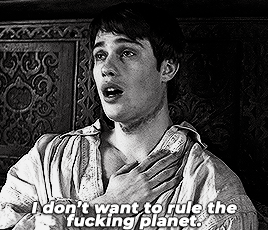

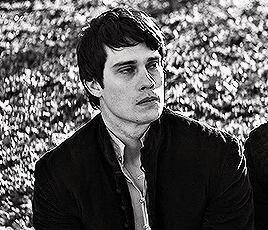
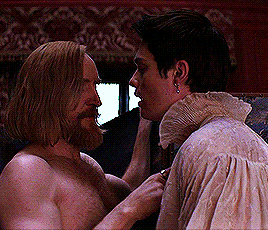
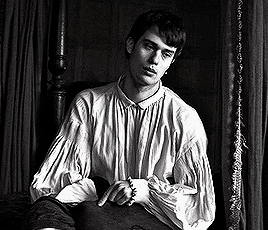



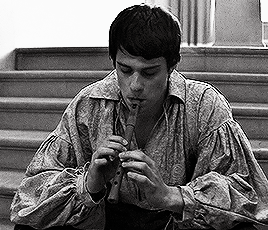

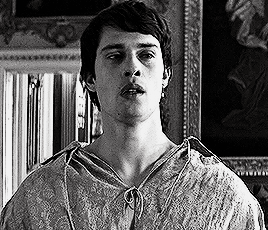


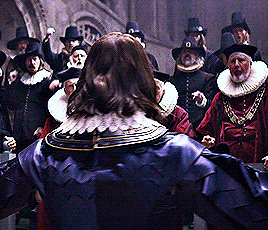

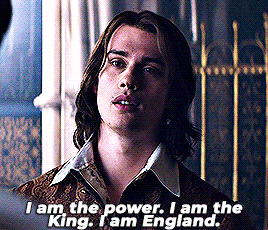
You are not who I raised.
Oh, that is all I am, mother.
#mary and george#maryandgeorgeedit#mary & george#perioddramaedit#nicholas galitzine#userninz#chrissiewatts#usersteen#usergayppl#usermegsb#mine*#mary and george spoilers#and thats on acting!!!!!!#sad pathetic little george you will always be loved#the way his whole demeanor changed throughout was incredible to watch#i need some awards to be won i'm so serious rn#and the way nick described it: having to play the manipulator and the manipulated at the same time#i Get It now. truly#not many people have that talent to make you feel that way about a inherently bad person#cant believe nick just fell into acting my god
866 notes
·
View notes
Text
ill have peace when people realize that theres barely any romantic implications beyond waifubait with hajime & chiaki in sdr2 (hajime is even like “what is up with this girl” multiple times because she cant hold convo, love her) meanwhile there’s immediately romantic implications between hajime & nagito
hajime and chiaki’s relationship is not inherently romantic beyond it being a boy and a girl who care about each other, and people thinking that needs to be romantic. it makes more sense as an important friendship. because chiaki is important to and cares about ALL of her classmates in the same way.
but ultimately chiaki COULDN’T save hajime. not in dr3. it’s true that a vision of her manages to talk hajime out of his despair in chapter 6. but the REAL chiaki could NOT save him from himself, because she has a fundamental mismatch and doesn’t truly understand his feelings on worthlessness and lack of talent. she has a talent, she even says to him that it’s “harder” to be talented than not, and she’d prefer it. that’s completely ignoring his feelings on the matter.
while it can be argued that dr3 shows more romantic implications between them, it’s also where she’s least compatible and helpful for him. she can’t understand why he’s so upset about talent, so she can’t talk him out of his mindset and prevent him from doing the project. even if she doesn’t know that’s what her words are doing, she still fails.
i won’t say komaeda would talk him out of it, because i don’t think many people could. hajime hates himself deeply enough to become another person, it’s hard to talk anyone out of that mindset. but komaeda understands hajime in a way no one else does - because everyone else in sdr2 is talented, and doesn’t really ride or die for the whole “talented vs untalented” dichotomy, but they don’t not participate in it.
komaeda isn’t really talented on the other hand, and he even wishes he wasn’t, and treats himself like he isn’t. because he believes he doesn’t deserve the title. just like hinata, he believes strongly in the worth of ultimates and the worthlessness in comparison of those beneath them - like himself and hinata.
komaeda’s worldview is nearly the exact same as hinata’s, just pushed a bit further and a bit more twisted. hinata’s worldview isn’t any more healthy than komaeda’s, either - a healthy worldview doesn’t lead to you lobotomizing yourself. they understand each other in a way no one else in sdr2 can because they both have this inferiority/superiority complex about talent.
that’s why the narrative revolves around them so much. their stories begin and end with each other.
chiaki is important to hajime, yes, but not in any romantic sense. they’re friends. and that’s fine. a male and a female character don’t have to be romantic to be deeply important to each other. danganronpa is not above putting an m/f ship as endgame, this is obvious with naegiri, and if that was ever the intention with hajime and chiaki they would’ve. but instead we see a literal scene where hajime leaves his memory of chiaki behind and moves on from her, as he needs to, as they all need to, carrying her memory with him but not living in the past, and as he leaves her he joins nagito instead.

and this is the FINAL shot of them. to end the series. i think it’s pretty clear what they intended with this.
essentially, nagito and hajime complete each other. they are soulmates. end of ramble
#nagito komaeda#hajime hinata#chiaki nanami#danganronpa#komahina#dont get me wrong though i still like platonic komahinanami#with komahina dating + their qpp lesbian chiaki#i just dont fuck w her romantic with either of them#1. bcuz komaeda is gay#2. i t hink shes a lesbian#3. hinanami would not last if they tried bcuz theyre so nonromantic lol
1K notes
·
View notes
Text
there are of course many different appealing aspects to bladeweave but one that i feel is underexplored in the few works in this fandom is this: what happens when you put together two people who are not only givers, but who actively see taking as inherently bad, selfish, almost antithetic to romance?
both wyll and gale not only want to wow and woo their partner, but also refuse to ever have it be the other way around because they so desperately believe they have to make themselves useful in order to be attractive, after being used for their talents and abandoned when inconvenient for so long
you'd expect their romantic notions to make them compatible, but in reality neither of them is ready to accept the other's advances, and so they're at a standstill
what happens when wyll offers to massage gale's bad knee, and gale almost flies off the log he was sitting, assuring him that he's quite fine and it's in no way necessary? when gale tries to wax poetic about how wonderful wyll is and wyll deflects every compliment, you are too kind to me, don't waste your night on me, go and dance and enjoy yourself? when gale tries to woo wyll with his stars projection, but wyll wants to woo gale with his dance, and neither of them wants to let the other be the one to do the work?
i love you, let me be useful to you, let me stay with you. i love you, please don't waste your time on me, i promise im still useful, stay with me
and in the end, they both feel rejected in their advances. they can't meet the other halfway, because they love him too much to take. they're too scared of losing them, and so they never meet
what happens then?
how do you convince two chronically insecure romantics to be the one wowed every once in a while?
how do you tell a devil and a sinner that they're enough for the god's chosen and the hero they fell in love with?
how do you make it work when you're too similar, too enamored, too kind, and too romantic to make space for the other?
how?
#GOD IM BEING SO NORMAL TODAY. NOTHING BUT NORMAL POSTS. URL CHECKS OUT MOMENT#bg3#baldurs gate 3#baldur's gate 3#bladeweave#wyll ravengard#gale dekarios#meta#overflowing trashcan
131 notes
·
View notes
Text
I've been a part of the phandom since I was fourteen back in 2012, but i've only recently deviated from my lurker ways and started being active in this community on tumblr. which I have been enjoying immensely! I'm super confused about something however, and so i'm making a post about it. please help.
often when I see the word "parasocial" used among the dnp audience, I've noticed that it's used with really negative connotations. Or with the implication that having a parasocial relationship is inherently bad and terrible. today, for instance, I've seen the term parasocial likened directly to "creepy."
I'd like to ask why that is-what has led to the perception of a parasocial relationship in this fandom as one that is intrinsically invasive and creepy. And I'd like also to put forth my own thoughts on why I think it's unhelpful and incorrect that we use this term to be a near synonym for creepy.
first, a definition. I'm turning to Hank Green for this, as he succinctly sums up what a parasocial relationship is in this vlogbrothers video (a recommended watch). He says a parasocial relationship forms "when the parts of your brain that are designed to have a social relationship between you and another person are used to have a relationship with a person who does not know who you are or, sometimes, cannot know who you are... because they're Huckleberry Finn."
At its most basic, a parasocial relationship is a relationship between you and someone fictional or nonfictional who doesn't know who you are. Hank goes on to say, importantly! that parasocial relationships have been happening since the beginning of time. People have been fans of famous or talented people since time immemorial, people have cared for fictional people since the first stories were told among humans.
~ ✌🏻continued below✌🏻 ~
Similarly, in one of his Am I The Hole videos, Phil says that becoming obsessed with things is normal. "People hyperfixate on stuff. It's fine." We all do it.
In many ways, parasocial relationships are as natural as myriad other forms of human bonds. Humans can't help but connect to each other. To other living and even non-living things. Bonding and connecting and forming communities is what we do. And because of that, I think it's a disservice to oneself be ashamed of being in a parasocial relationship, or to use parasocial as a term to serve as a stand in for a disrespectful fan of someone. I think it fosters a sense of guilt where there shouldn't necessarily be any, especially if you as a viewer of Dan and Phil are respecting the boundaries they have set. You are doing something so normal! So human! You are finding support and comfort and empowerment and motivation and creativity and any number of other things from other people.
There is great joy and great good that can come from parasocial relationships. Obviously! Think of Phil's birthday stream, the feelings you experienced when the lights came on in the theater after TATINOF, all the laughs (among other things) Dan and Phil have gotten from our memes and art.
And it's important to consider the other side of this as well. Dan and Phil also have a parasocial relationship with us. It's different, of course, but they do think of us, make decisions because of us, without truly knowing us. At different points in time maybe they know the loudest of us, a few individuals, but for the most part they do not know who we are. They don't know who you are. But they do think about you. They think about what ties us together, our queerness, our beliefs about the world, the internet, our status as socially awkward and or mentally ill nerds etc. They think about how certain videos or projects or merch will be received. All creators are in a relationship with their audience. And it is often a parasocial one.
Basically i find myself exasperated with stumbling over the word 'parasocial' in this fandom. I want to have the information and know the truth and add my own thoughts! Maybe parasocial is used by other people elsewhere on the internet to mean something bad, but my thesis is this: it's not a bad word. It's a descriptor. And it's a normal thing. Those people are wrong. You shouldn't feel bad about being in a parasocial relationship with Dan and Phil! You should call that relationship what it is with pride! And do as much good with it as you can.
conclusion: talk to me about this! What is your perspective, what am I missing? let me know please. would be happy to talk about this with anyone.
(ok what do i do now do i thank you for reading? i don't do this. text post over.)
59 notes
·
View notes
Text
Part 2 of Everlark and their parents lets go Peeta your turn now.
Now this one is harder. We know very little explicit information about Peeta's family so a lot of this will be inference and my own personal interpretation of the family and their dynamic based on what we do see, what we don't see, and the way Peeta acts, so if you disagree with me that's all good lol.
So first, Peeta grew up in an absuive household. That's not a debate that's explicitly canon. Him mother not only hits him, implied to be with something, but also calls him a worthless creature when he burns the bread for Katniss. No matter that circumstance that is not how you treat your eleven year old child, that is not how you treat any child period, and this clearly isn't a one off or first time. Even though we personally see very little of the abuse on page, I at least think its impact of Peeta is very clear.
This boy has abysmal self esteem, when he discovers Katniss and Haymich have hidden things from him again he feels as if they view him as weak and stupid and too dumb to get it, that's the automatic assumption even though we know that's so far from the truth it's laughable. But for a child that grew up being consistently insulted and belittled it's not that far of a jump to make.
His ability to lie, also I think is relevant here. That kind of ability with words doesn't come from nowhere, that doesn't just happen that's something practiced. A theme with Katniss and Peeta's talents throughout the trilogy is that even the things they are good at and that help them were born from necessity. Katniss is so good with a bow and practical survival skills because she had to be, because even though she grew to love hunting, she and her family would have died without it. Peeta's skill with art comes from working at the bakery it comes from years worth or practise and labor he put in as a child, and I think his ability to lie, manipulate, mask his true feelings and talk his way though things stems from a similar place. His mother is called 'the witch' colloquially, we see she clearly has a temper and resorts to violence and insults quickly. A lot of children who grow up in abuse grow to be very charming, they learn how to lie and manipulate the situation to get themselves out of trouble and to keep themselves and potentially their siblings safe. At least to me Peeta's unmatched ability to impact and morph a situation with just his words could very easily be linked back to his childhood. We all love that Peeta is such a good manipulator but only ever uses it for good, and I think this is partially why, because he doesn't even want to be necessarily, it was a skill born for survival. His mothers cruelty is also shown very much to not be reserved purely for him, she chases starving children away from their empty bins, speaks awfully about the seam and the people from it.
His father is a complicated man. he clearly dose have love for Peeta and is shown many times to be a kind man at his core. But he is passive. He may bring Katniss cookies and make generous trades, he may have been the one to impart that inherent kindness we see in him onto Peeta, and may have been the only safe adult in the house, but he is passive. We don't know the extent of how much he steps in when his wife starts acting out, but from what we can see of her effect of Peeta clearly not enough. He also doesn't come to live with him after the games, none of them do. And while I understand practically that might not be the most reasonable situation, a newly disabled, traumatised sixteen year old boy was still left to live alone. His family may have visited often, they still talk we see him going to dinner with them, but I think their lack of mention speaks more than anything else here.
The relationship between his parents was also not exactly the best model to grow up observing. When he is five years old his dad tells Peeta is was in love with another woman, he points out her child to him, explains how he lost her. There is no addendum of how much he loves his mother now, how it was in the past. Peeta grew up with parents he was acutely aware did not love each other and from what we see and here, don't even pretend to act like it.
Now how dose this relate to Katniss. This first part is more my own speculation so ignore me if you disagree, but Katniss in the first games mentions Peeta doing certain things with her she remembers her parents doing, and wondering where he learnt it from, thinking surely not his own parents. And I think she's right, I think he learnt it from hers. Peeta is observant, I think after his father pointed out Katniss and her mother he payed attention, not just to Katniss but to her parents as well. I think he was a little fascinated by this family, these parents who clearly adore each other these children with skin clear of bruises who have never been made to feel like nothing from there parents who clearly think the world of them. There was six years from when Peeta noticed her to Mr Everdeens death, that's six years for him to observe this family and their love. Not obsessively, not even knowingly, but I think it happened. I think the Everdeens weren't just Katniss's reference for a relationship but Peeta's as well. I don't think she was the only one drawing comparisons, even if he didn't completely realise what he was doing.
(Additional evidence for this pointed out by @intellectual-punk in Mockingjay Haymitch tells Katniss the doctors showed Peeta the propo of her singing The Hanging Tree and he recognized the song and Katniss says she doesn’t know how he could as he never heard her sing it. Haymitch says he remembers her father singing it as their fathers traded. Peeta hasn't heard this song since he was 11, he’s 17 at the time of remembering it. So for him to remembering it after so long after last hearing it and clearly not hearing it around the house we can imagine that her father must have sang it near every time the two men traded and that Peeta was either specifically listening to his singing as he knows from his father that that is how Mr Everdeen won over Mrs Everdeen or he was just generally paying attention to the man either on his own or in relation to Katniss.)*Found in notes {Thank you so much for this}
I also think, going back to people seeking out the familiar, that Katniss reminded him in certain ways of his father. They're both quiet, both people associated with providing food in one way or another. I think he see's her in the way that while they both clearly love him, they both struggle to show him, leaving him to question it for a long time. But where his father fails to protect him, Katniss doesn't. Katniss doesn't have his fathers passivity, far from it, Katniss Everdeen is anything but passive. She actively works to protect him and others, she speaks out loudly when she finds something wrong, she still has that kindness, but it never gets in the way of what's necessary.
This is also where I see his mother come in, I think he dose see some similarities there. In their tempter, in the sharp way they can use their words, in the way she underestimates him in the beginning and even hurts him on occasion, shoving him into the vase (I think?) and cutting his hands after the first interview. But in so many ways Katniss is the opposite. Peeta may have developed a crush because of her voice, but he falls in love because of the way she helps people, because he knows her intrinsically and intrinsically Katniss is someone who cares. He always comments on her healing ability, even if she finds it lacking it's clearly something he loves about her, hands that heal instead of hurt. His mother was cruel to everyone especially those less fortunate, meanwhile Katniss would give everything on her to those who need it more. He see's the similarities yes, and unconsciously that familiarity might be a small drive towards her, but ultimately he loves Katniss for the ways in which she is different from his mother, the ways in which his mother failed, for the ways in which she stepped in where his father fell short. As well as for a lot of other reasons of course, but I think his parents impact is definitely something to consider.
#peeta mellark#katniss everdeen#everlark#mr mellark#mrs mellark#the hunger games#thg#katniss and peeta#tw: abuse#part 2#i love him so much#my love I'm sorry you didn't deserve that#they deserved so much better#character analysis
59 notes
·
View notes
Text
Okay I’m going to say this and I’m going to say this once.
I do not like how the relationship with Jamie’s father was handled in season 3.
If they wanted to go the route of forgiveness they absolutely could have. If they wanted to go the route of his dad going to rehab they absolutely could have. Those are not inherently wrong or bad. It’s a show about forgiveness and I get that. It’s a comedy and Jamie is not the main character - I get that too.
My issue is this: the show went out of its way on multiple occasions to show just how violent and abusive James is. Just to give a few examples:
Repeated physical abuse
Repeated verbal abuse
Planning, funding, and likely pressuring the sexual abuse of his 14 year old son (a minor and below the age of consent in both The Netherlands and the UK regardless of the age of the girl in the red light district)
The willingness to beat Coach Beard (basically a stranger to him) with a metal pipe in a 3 to 1 fight in a back alley which could have realistically resulted in his death (and calling Beard “son” right before the final blow)
Jamie literally gave up his dream - a job as a professional footballer on a top hometown team - to leave the country on a trashy reality show just to get away from his father. The show traced a large portion of Jamie’s issues back to his relationship with his father. Not all of course - but that was a big theme of his growth and development.
So even if we entertain the notion that this stint in rehab was successful and James is sober - that’s great. That’s a storyline I wouldn’t mind hearing - IF we had the appropriate time to show it. But the thing is, we didn’t. This season was disjointed and rushed in many ways - and I’m not complaining - I still loved it. But if they’re going to tackle a topic this serious, they need to do it right. They need to be clear that alcohol was not the only problem James had and that sobriety does not absolve you of accountability. As important as it is to portray the message that all human beings can change, including addicts, it is equally as important to show the serious work that addicts in recovery put in to address the hurt that they caused through their addiction. It is not easy work to battle addiction and to mend relationships - sometimes part of recovery is accepting that you can’t mend things with everyone you’ve hurt and that is the right of the victim to decide how they feel.
We were shown none of this. What we got instead was:
A speech from Jamie’s mom about how he is still amazing despite his dad while still somehow crediting Jamie’s talent to his dad’s abuse
Ted telling Jamie to forgive his dad as he’s mid-panic about his safety and his dad’s location
Ted making a point to say the forgiveness was for Jamie’s sake, not for James - which was ALMOST good until they ruined it
Denbo and Bug suddenly supportive despite being just as violent as James in 2x09
James suddenly in rehab for 0.2 seconds
Jamie reaching out to his dad via text despite having no idea his dad is in rehab - something that is realistically compromising his physical and emotional safety
A quick clip of Jamie bonding with his father before the season/series ends for good
The reason I connected with Jamie so intensely from season 1 was the shared experience of abuse from my father. I want to be clear that I know I’m projecting - that’s what fandom is - and I in no way expected the show to end exactly as I wanted. However, this is what I would have liked to see as 1) an abuse survivor 2) a licensed therapist and 3) a person:
The message that you can heal without forgiving those who hurt you OR that you can forgive them and still not allow them back into your life (ESPECIALLY if it compromises your safety)
The message that sometimes people don’t change for the better and you can grieve that relationship while still fostering healthier ones elsewhere.
An emphasis on support systems and chosen family when someone doesn’t have the reality of a parent or partner getting better (we saw this with Bex seeking out Rebecca and Rupert’s assistant)
Instead of Man City suddenly cheering for Jamie, which felt insanely unrealistic, having the cheers of Richmond fans drown out the boos and verbal assaults of the Man City crowd - further emphasizing that despite the pain he has attached to Man City and his father, he has a home with Richmond.
So to wrap up this very long rant, I feel very disheartened by this part of the season. I still love Ted Lasso and always will - there were so many parts of this season I absolutely adored and wouldn’t trade for anything - but I feel that they dropped the ball on this one. Most people don’t get to repair relationships with abusive parents. Is it possible? Of course. Is it important to depict that it can happen? Absolutely. It’s a show about forgiveness. But they didn’t need to do it like this for Jamie’s storyline. They could have kept the speech about forgiving James for Jamie’s sake and deleted all of the rehab/texting afterwards. I still wouldn’t have been thrilled but it would have made more sense to me in context of the show. And it would have meant a lot more to me as someone who’s father is unlikely to ever stop being a risk to my safety.
This just felt bad. Jamie Tartt had one of the best arcs I’ve ever seen in media and he deserved better than that.
#ted lasso spoilers#jamie tartt#James Tartt#anyway#you don’t have to agree with me on this#this is just my take#clearly I’m personally triggered a bit by it lol#I’m not looking to argue or anything just needed to vent#a lot of things felt off this season and I know there’s a lot of behind the scenes reasons for that#some we’re aware of and some we aren’t#but this is one of the ones that hurt#I have a few others too but since this is a Jamie blog I’m just posting about the Jamie ones#don’t even get me started on Sam being told to forgive the people who committed a hate crime at his restaurant#and no further acknowledgement of that trauma and safety issue#and no explanation of how he got onto the Nigerian team with Edwin Akufo actively sabotaging him#okay I promise I’m actually done now#long post
185 notes
·
View notes
Text
Something I see a lot in talks about AI art is something I've seen about a lot of different kinds of art: a desire to have the product reflect skill and/or talent.
Like, it reminds me so very much of how some (usually older) people react to music software. It used to be that you'd have to go the long way and spend years learning the guitar; now just anybody can simulate that sound for you and clean it all up and make it perfect!
Of course, there are many provisos to that; not anybody can open up that sort of program and put together a great-sounding song. The people who make e.g. really classic Vocaloid songs are very skilled with the program and very talented r.e. music. (And perhaps that is or will be true for AI, too: that anybody can just create a picture, but someone very skilled with a particular program can make something very specific and good!)
But it's that initial impulse that just... bothers me, a little. Because, yes, of course I understand the fear that you devoted years of your life to a subject and now it can be generated by just anyone. But why turn it around and treat it as some sort of principled, purist stance? Why does someone HAVE to devote years of their life to something to make art?
It just feels a bit. Suffering romanticisey. Either that, or making art inaccessible to ordinary people. Like 'Artists' are some inherently different kind of person.
Of course we can still value the dedication that went into specific kinds of work. Maybe that's your favourite thing about art. But doesn't it open up art to so many different kinds of people when barriers are taken away? People who can't afford to slave away for years on it? People who for some sort of physical or mental or whatever reason just can't ever really be as good with the 'traditional' process?
Again: this is not really about AI art and whether it does offer those opportunities to people. This is about the initial reaction that letting ordinary people more easily create art is somehow bad, and takes some kind of soul out of the process. But people have different capabilities; what is easy for most people is very difficult for others. Why is making art impossible for some people so important? What is so much more 'real' about art that requires very special tools, or knowledge that is barred the masses? What are we losing by letting 'untalented' people overcome certain obstacles?
#same thing with autotune#my mum always hated it. if they need autotune they can't sing!!#but i always felt. some people maybe arent QUITE good enough singers#but have really interesting ideas for songs or singing#and id like to hear them!!!#also autotune became a thing not to hide imperfections#but to create a unique sound of its own#VERY quickly#i just.#want to question people's reasoning here#it may be that ai art is bad inherently. but we should dislike it for the right reasons
77 notes
·
View notes
Note
{written on pub stationary, stained with aclohol. The hand writing is messy, obviously written in a less than sober state. The paper is creased and crumpled, as though it’s original destination was to be the trash bin. Multiple words are misspelled or crudely scribbled out.}
~
Dear Dekarriose Dekarios,
I guess youre actual title now is the Wizard of Waterdeep, it may be inappropriate to still simply call you ‘Dekarios’ or ‘Gale’. I still will, change all you want, detest me all you want for it, I cannot change that image I still have of you from our youths.
A cocky bastard smug young man who probably had a good reason for being smug. A learned young wizard who, despite his inherent talents, buried his nose in a million books a second to learn more. I hated you for it back then. I think I hate you for it now.
I don’t know. I’ve never understood it. I never figured out how you could be more with so much inherent magical talent, but not enough to make you a sorcerer. I never understood how you could be more in control of your magic than a sorcerer. I never understood how we could be the same age, and yet when I first started my academic career at Blackstaff you were already finishing yours. I admired you for it, I hated you for it.
I thought you hated me too.
Not hate, that’s not right. I thought you abdhorred disliked me. I thought in some way, it was okay, we were rivals. We had our fun, I cursed you a few times (if you never knew that was me doing it. Sorry.), you explained every spell you knew in such detail I assumed you were being condescending on purpose. I casted spells with ease without trying but I could never learn a new spell. You learned a million new spells but took great effort in casting them. I hated you for your succeeding where I failed. I thought you felt the same.
I question that recently. I have people who hate me now. It’s not the same. If you did hate me, I guess I liked the way you hated me, it was more fun than how I’m hated now. But did you hate me? Were you being condescending, or did you just like to talk about things you found interesting? Do you even remember a word I’m writing down? Do you remember me? I can’t bame blame you if you don’t. It’s been so many years, even I only remember once I’ve reached the bottom of a bottle, but I remember a lot.
I’m reaching the end of the page. I feel I’ve written a lot about nothing, so I guess it’s time I cut to the chase. I do miss our rivalry, our misadventures, our friendship, whatever you’d call it. I miss Gale Dekarios, the smug little bastard that once tried to tutor me. I miss you.
I wish you the best,
Irisa
-~•~-
{set before the events of the game, written by my tiefling Tav, Irisa, a wild magic sorceress who briefly did not know she was a sorceress, thus she briefly tried to learn Wizardry at Blackstaff. It did not go well. In her time there she had a rivalrous relationship with Gale, because the two of them were young and immature, and eventually she was expelled from the academy. Years down the line her life is not great, she’s drunk a lot, misses petty arguments with our favorite wizard, reflects on their time together, and wrote this letter and sent it out when drunk and probably forgot all about it come morning.}
Dearest Irisa,
Your letter, though quite barely decipherable, comes as a bit of a shock for me. I did not expect to receive word from you after so many years, and though I can tell you’re not doing exactly the greatest at the time of writing, I hope you’re well otherwise.
It may shock you to know that, despite how many years it’s been, I do remember you. For all it’s worth, I remember the rivalry between us. Who puts a Wizard and a Sorcerer in the same fold? I’ll never understand how that came to be, but it was an enjoyable few years with you there.
I do get that a lot, the admiration and the hatred all mixed in one. It may do well to understand that I am, or, rather, was one of Mystra’s chosen. Though my abilities as a child were to be challenged, it was all because of her. It’s not every day you have an eight-year-old human practicing magic, and Mystra knew that of me. She’s the only reason why I had such control and understanding, though it helped being quite studious.
Despite it all, I can say I never did hate you. You pushed me to countless new limits, helped me see my oddities and how to work through them, and showed me the intensity of magic on a grander scale than reading books ever could. You brought out the best in me, regardless of our differences.
While I didn’t hate you, I can confidently say I did envy your ease in casting spells. If only I could whisk a spell together that easily! Concentration gets the best of me nowadays, perhaps I should have practiced more of that while at the Academy.
I do sincerely apologize for any condescension you may have felt. I tend to do that at times apparently! It was a genuine interest on my part to have someone who shared a similar understanding with me, and I wanted to tell you of all the worlds we could both accomplish. My mother has quipped it as “Galesplaining”, whatever she intends that to mean.
I remember you completely. All the glory, the joy, the hurt, the failure. It’s ingrained in my mind and I doubt I can ever sand it away. I wouldn’t want to, either. You made my time at the Academy more enjoyable than it had been for years. You changed me, in some of the best ways imaginable.
I can’t deny finding myself at the bottom of a bottle stirring over the past, much like yourself, wondering what I could have changed or done differently. Maybe we could’ve stayed friends, that’s a nice alternate reality to think of.
I miss you, too, Irisa, even if you were the cause of all my misdemeanors and failures when my day started on the wrong foot. I have to know, were you the one who caused my portal home to get so out of shape?
When you’re sober, I implore you to visit my tower in Waterdeep. I’d like to catch up with you, it’s been far too long since we’ve spoken.
From the desk of,
𝑮𝒂𝒍𝒆 𝑫𝒆𝒌𝒂𝒓𝒊𝒐𝒔
And, for reference, I sort of liked the way you hated me, too.
text reads: gale dekarios
#baldur's gate 3#fanfiction#for you#for you page#gale dekarios#gale of waterdeep#bg3#bg3 gale#gale fanfic#answered asks#ask response#asks#send asks#anon answered#send anons#letters#writing#baldurs gate gale#baldurs gate 3#baldurs gate iii
22 notes
·
View notes
Note
not a question but basically any time i remember your art exists im looking it up and down and trying to take inspiration from it. your expression work is always top notch, and the way you depict faces is the perfect balance between cartoony and well defined
oh my god this is such an amazing compliment! thank you so much!
you know, i think this has been a long time coming. im going to take this as a chance to go in depth about how my style works, why i do what i do and how i do it. do keep in mind that none of this is me saying "this is the objectively correct way of doing art" but rather just how my own process works, what I like to see in my own art.
that balance that you speak of comes from a commitment to underlying structures. what im going to call the stylization sandwich
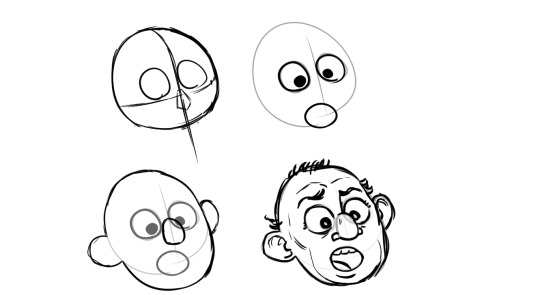
i start with a clear, well defined solid structure, i add whatever wacky cartoony features i want on top of it (none the less strongly tied and guided by the underlying structure) and then i refine by adding as many more realistic, grounding details i want, although you can go too far with it so i gotta be careful or ill end up with those shitty "cartoon character IRL would look scary!" clickbait drawings.

(quick aside, this trend fucking sucks, its obvious the artist went out of their way to make the drawing creepy, this pretension that "actually the character would look scary irl" deliberatly misundertands the principles of stylization, its as creatively bankrupt as jokes about mario eating mushrooms)
getting back on topic, the point is that, as long as the underlying structures are solid you can build whatever you want on top of them and it will make sense

a key tool here is internalizing the way the proportions on the face work. and i say internalize because obviously i dont actually have the golden ratio memorized inside my head nor do i stop and measure and calculate all the proportions in the features. i just read a lot about drawing, i drew a lot, i tried to always keep a critical eye to what im drawing and see if it "feels" disproportionate. once you get an eye for it then you know how far you can push things before they complitely break
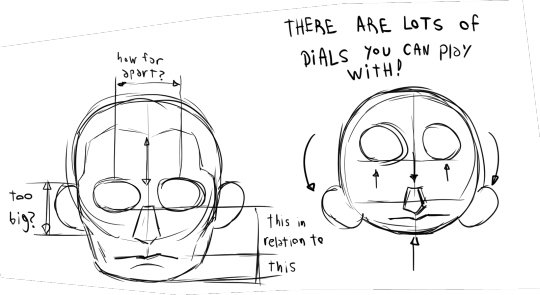
let me give you another example of what i feel is a botched execution of this.
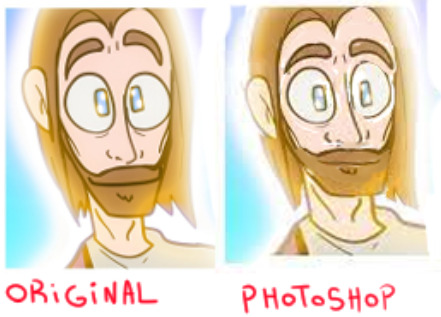
if you look closely at the face on the left there are a lot of things that dont make sense. the corners of the eyebrows dip down into the eyes when usually the eyes are enveloped by the eyebrows, the way the beard grows around the nose is just not how facial hair is distributed, the mouth is too big, etc. on the left i used photoshop to reorganize the factions into something that makes a bit more sense to me
(another quick aside, the real big problem at the heart of the original drawing were not so much the proportions but the tangents, when different lines touch each other like this that is usually a big no no but that is a topic for another day)
also a lot of it is just me cheating. yeah i cheat. you ever heard how people say there is no innate talent and its all practisce and hard work. well, yeah, that is mostly true, but is also true that some people are born with inherent advantages. either taller or more predisposed to being thin or with better facial structures or better innate hand-eye coordination. i was born with an uncanny capacity to visualize stuff. i have whatever the opposite of aphantasia is. i can borderline hallucinate things if i want to. and that goes coupled with the visual intuitions i developed through practisce and training.
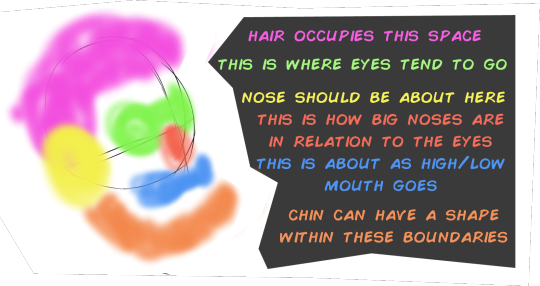
so first come the learned wisdom, and then comes the innate talent that helps me exploit that learned wisdom to its full potential
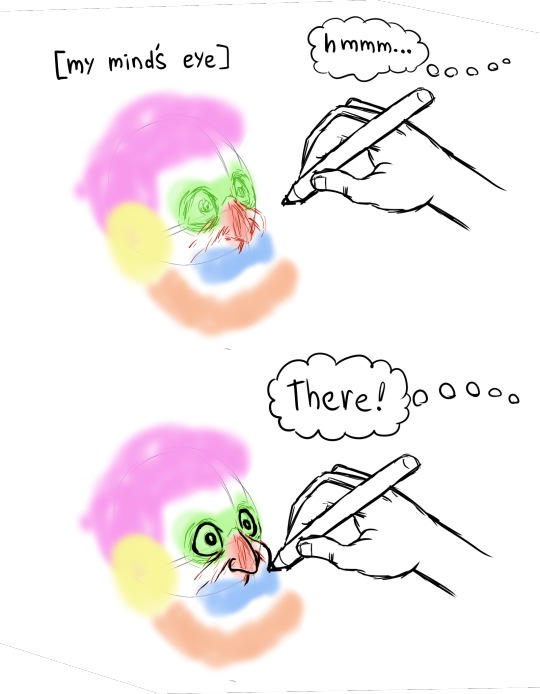
on top of that is corporeality, i try to draw in such a way that it conveys depth and weight to the things im drawing, certain kinds of stylizations dont care about that and choose instead to have their drawing look flat, a classic one is the UPA style
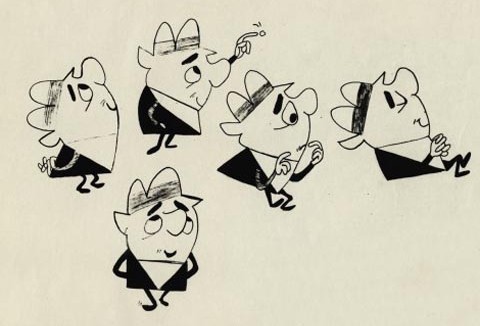
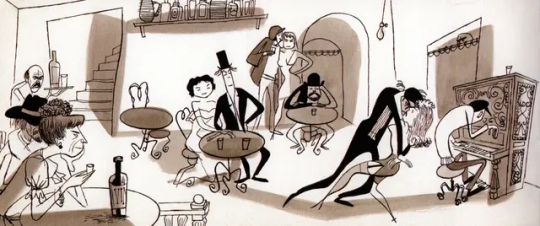

is a very fun style! very cute, very dynamic, very expressive in its simplicity. it became very popular in the 60's and 70's. personally i choose to go in a different direction. i draw in such a way that if one were to turn my drawings into 3d models not a lot would get lost in the process.
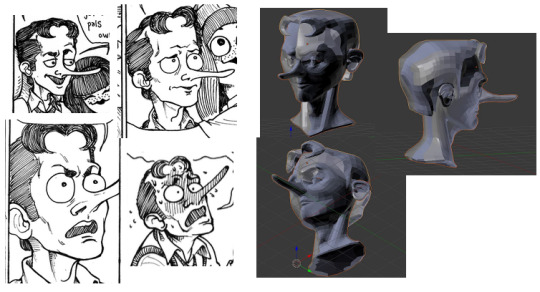
whereas other artists....

...not so much
but yeah, ultimatly it all goes back to underlying structure. any drawing can work
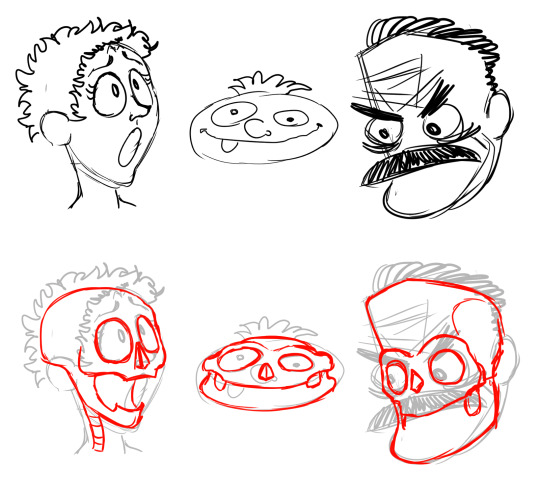
as long as you have a strong foundation underneath.
PS: if you like my style i cannot reccomend enough the art of @rezuaq i feel they follow a lot of the same principles i talked about here but i could be wrong.

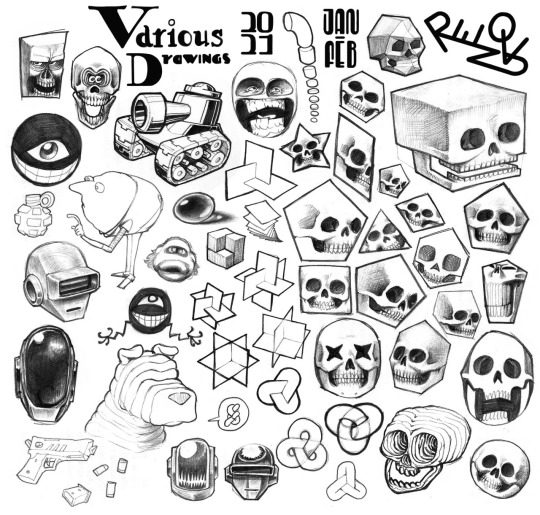
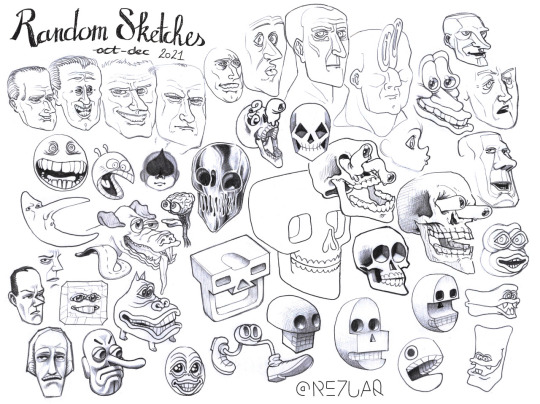
they have been my biggest inspiration as of the last 4 years, i shamelssly stole the design of one of their characters for jennyffer. go to their blog and give them a like
45 notes
·
View notes
Text
Yandere Character Sheet I
1p Estonia: Eduard von Bock

Trigger warnings: murder, emotional manipulation, trauma bonding (?), blackmail, stalking, unusual punishments, misuse of medication and medical procedures
Attributes - What sort of Yandere is he/she?

Above everything else, he is diligent. Diligent in tracking all your movements, and mapping out a future for the both of you. Lies are quickly uncovered, because he will be fast to note the indiscrepancies in the falsehoods you tell him. Eduard would be quick to note changes in your demeanour and appearance, and would be charming enough to drop remarks about them, and to remember the things that you tell him. In many ways, he is a very good listener and would bring up things you told him years ago, things that you yourself would have forgotten. In that way, you also can't expect him to simply forgive and forget your transgressions.
In total, he is also of the obsessive type. All your likes and dislikes are carefully taken into account and noted. He'll use the knowledge gained to reach further conclusions through extrapolation and conjuncture. Should he really put himself into it, then he'll be able to recognise aspects about yourself that you are not even aware of. The danger here is that he sometimes confuses intelligence with infallibility and can sometimes refuse to accept that he is wrong. This would be a double edge sword for you, since it could lead to you using his blindspots and misguided beliefs against him, as well as him mistreating you based on wrong assumptions that he refuses to correct. It would also lead to him finding justifications for his disturbing behaviours, and you having a hard time arguing against them.
Eduard has the capacity to be very petty. With his good memory and inherent passion, he is capable of holding grudges for a long time. Most of the time, would like to present himself as a rational and logical person, but often, he’ll allow emotion to colour his judgement. While at the end of the day, he usually thinks before he acts, those actions would always be heavily influenced by his feelings. His obsession with you would have a cold edge, and his actions would commonly be calculating, but it wouldn’t change that he would be controlled by his own, unlogical obsession with you. As such, you’ll find him to be unable to let go of minor offences. He would wait, perhaps even so long as to convince you to think that he has forgotten about it, but he’ll inevitably punish you for it. Estonia will usually even wait for multiple transgressions to have occurred and then punish you for them all at once.
He also is very mixed when it comes to communication and that in itself can provide difficulties. At times, he is very direct and would be quick to tell you what is on his mind or if he doesn’t like something about your behaviour. At other times, the issue at hand would seem self-evident to him and thus there would be no need for words in his mind. That, or the body language displayed should be enough to deduce what is going on. In such cases he would become very frustrated when you wouldn’t catch on, and so, grave misunderstanding can arise.
Combined with his diligent nature is his talent for organisation. His surroundings would reflect this, with every item having its place. An easy way to aggravate him would be to mess with his organisation, though, he wouldn’t allow you to get away lightly with such things. That being said, this particular trait would also show itself in other spheres of life, like his social circle. Eduard would be very good at delegating tasks to the people under him, or even his friends, and making sure it works. Should you escape, you’d find all the exits to the city blocked, for example. Also, like every belonging has a place in his life, you also have a designated spot, and he wouldn’t like it at all if you would push the boundaries assigned to you.
Generally, it would be a question of how much offence you would take to his rather unorthodox practises, with him being so very polite. To you especially, he would be a perfect gentleman - taking your coat, inquiring about your day, never using swear words in your presence. He would be sensitive enough to notice if and when he would be pushing too far, and knowing when to retreat. Oh, he can be overly sarcastic and he has a dark humour; he is petty and mean sometimes, but never impolite.
Cornering - How would they get you?

Eduard would have been in relationships before, and what would have always irked him would have been how easy it was for his partners to leave him. Thus, he would strive to prevent that in his relationship with you from the very beginning. With the carrot and the stick, if it has to be. The carrot would be advertised benefits - such as him being an attentive partner, ready to make sacrifices for your happiness and somebody that won't beat, somebody that will treat you like a human being and not some plaything or extension of himself.
Eduard would be ready to indulge you and provide for you, to take you out to the theatre, to fly overseas with you on holiday or attend a festival. He wouldn't really be the sort to lock you in the house - that would be boring. But he would become a permanent fixture in your life, one that you would never get rid of.
Part of this would be due to the stick - he'll have some dirt on you. It must not even be that it really is something condemning, you must just not want to go public. Perhaps it would be some dirty family secrets that he would trumpet out for the world to hear. If it would mean keeping you, then he would even go as far as to threaten to upload nudes of you. Of course, he would make sure that that isn't the only threat that he would shackle you with.
Expectations - What do they expect of you?

First of all, he would require you to be intelligent. Something about stupid people just irks him and would make him want to crawl out of his skin. Having to repeat his words and explain simple concepts again and again would lead him to start tearing his hair out. Eduard would want somebody he can converse with without dumbing his language down, somebody he can have invigorating conversations with until the early morning hours. Surprise him, challenge him and his own intelligence and he'll be delighted. Show off your intellect, make him flounder in a debate. But don't be too intelligent - he wouldn't want you to outsmart him.
He'd also prefer a more reserved person. Estonia would want to feel that only he has the privilege of really knowing you, and that wouldn't be possible if you'd wear your heart on your sleeve. Also, half the excitement of being in a relationship with you would be being able to peel one layer after the other away. Only he should know your deepest and darkest secrets. It would also make sure that you are less inclined to stray. The thing is, he doesn't want to restrict your movements or have to reveal his true colours, so if you stick to him of your own accord, then it is wonderful for him.
Paired with that comes his wish for a clingy partner. He wishes for a person that wants to be around him as much as he wants to be around them. This could go hand in hand with the aforementioned reservedness if you are suspicious of people but are lonely at the same time. Perhaps you were betrayed in the past, or generally had a bad childhood. Either way, if that leads to you sticking like glue to him, and only him, then he'll be as happy as pie. After all, he is the only person you can trust, in his mind, so it is all the better if you are of the same opinion, eh?
Have a sense of orderliness. The last thing he wants to do would be cleaning after you or having to chide you for your behaviour or speech. Dress well, eat well, speak well. Acclimate yourself to his own orderliness and help him run a clean household. He would also like it alot of you would make things yourself - like making pottery or brewing alcohol or dyeing textiles. That way, you shouldn't be a person that just sits there and theorises or schemes the whole day away, but actually puts their plans to action more often than not.
Be cynical over optimistic. Life is nasty, short and brutal, and he won't be the one to rip the veil from your eyes. Somebody that can match his gallows humour and suspicious disposition is prefered over some ray of sunshine that is sheltered and naive. Should you still land in his care despite brimming with optimism, then you'll be forced to grow up fast.
Faded - Would they let go of you in any way?

It would have to be a situation where his world is turned upside down. His attachment to you would grow stronger over the years due to you becoming a cornerstone in his life - he would simply be too used to you to let you go. So, in order for him to relinquish you, a major cataclysm would have to occur.
Maybe war breaks out, and he loses sight of you in all the chaos. You scamper off to a faraway land while he is stuck in Tailin keeping the country running. The house is bombed, the grid goes into blackout. In some way, he not only loses you, but all the memories of you two together. By the time he has disentangled himself from war and all its consequences, you are long gone and the trail has gone cold. A similar pattern would occur if the matter at hand were a natural disaster, a revolution or societal collapse.
Punishment - How would they proceed if you do something they disapprove of?

Physical abuse is off the table for him - it is just so messy and he'd have to nurse you back to health afterwards. Besides, you are not some beast of burden that has to be disciplined through the crop, he doesn't need you docile or full of animosity. No, those are not qualities he wants you to have - he wants you to learn and grow and remember.
One of the things that would always frustrate Eduard would be how forgetful ordinary humans are. Should you forget your place together, or the unspoken rules on how your relationship is built, then he'll be inclined to help you remember. He'll make you write lines, be it on a chalkboard or a sheet, and that until your hand cramps. This would be to sear certain phrases into your mind. Other methods that would go along those lines would be repeating chants after him for a full hour or two, or putting a cassette player to your bed and having it repeat moral lessons on loop while you sleep.
Though, it wouldn't just be restricted to that - he would take simple chores and make them more difficult. Like making you scrub the floor with a toothbrush. Or he would go back to the old fashion ways and make you wash all the clothes by hand. The fire would have to be lit without a lighter or matches and all the good food stuff that you could easily buy in the supermarket, like butter and bread and cheese, would have to be made like in the good old days.
Else, sensory deprivation would be a favourite of his. In his eyes, there is just something so amusing about watching you stumble around blindfolded, completely reliant on him. Taking this in another direction, he would also encase one or two of your limbs in plaster. Not because of a broken bone, just to render you less mobile. Should he be feeling very petty, then he would give you pain-killers and "allow" you to enjoy the side effects.
Reaction - How would they react to you escaping?

On the one hand, he would be frustrated - you just had to ruin his plans for the afternoon. How dare you thwart his intentions. The question of "why today" would come to the forefront of his mind, and he would be pouty about having to come back to an empty and cold apartment.
On the other hand, he would feel very amused. With everything being digitised in Estonia, you wouldn't get very far without a phone. In that case he just has to wait until you return. Should you have a phone with you, then he can easily track you. Maybe he'll hack it to make life difficult for you, maybe he'll just watch your movements.
He'll call in a few favour, pull some strings, and then wait for somebody to turn up at the door with you in tow. When it comes to retrieving you, and would rather have somebody do it for him.
Naturally, there is also the flip-side of this coin, where he assumes that you didn't escape, but were kidnapped. Panic would set him, and the next hours would see him making one call after the other and playing detective.
Turnabout - Scenario: You have the upper hand? What would be different from their usual MO?

Seriously, nothing much. Actually, he would prefer for the two of you to be equals in the first place. As long as you don't leave him he is fair game, even if the situation is that of him being your butler or valet. He would even settle with being your nurse or attendant, for heaven's sake. Just as long as you stay, it is all fine, but as soon as you try to leave, all bets are off.
He would rather see you dead, than let you live without him. So instead of letting you go, if the process is immediate or just quick and he can't do anything to prevent you living without him, then he'll kill you. The only way you could get out of it would be by tricking him and then making a run for it, or convincing him that the separation is only temporary. Of course, you could make sure his attention is fully occupied by something/someone else, or have somebody more powerful hold him back and then sneak away.
Vengeance - What would they do in the face of competition?

As per usual when it comes to such things, he would rely on his wits. The knowledge that he isn't powerful enough to hold his own against a great many countries and entities constantly weighs on him. But mortal man didn't best the devil so often by being more powerful, but by using his wits.
Such is it here, where he would bargain and barter to get to you. Estonia would do his best to make himself the more attractive option, hoping to win your heart rather than having to best the competition. But if he has to best the competition, then there would be certain plans of action. He could make a deal and hid things in the fine print, making the other suitor indebted to him. Or he could resort to playing with words, either cornering them into a situation where they'd have to do as he asks, or by seemingly offering something up that is more attractive than being in a relationship with you. At the end of the day, humans as well as nations are selfish creatures, thus he would aim at making it more beneficial for the other person to relinquish you, rather than keep you.
25 notes
·
View notes
Note
you’re a very talented artist and i don’t have any ill will towards you. but some things need to be cleared up here. the problem is and has never been making kyle a trans man. there is nothing inherently wrong with that headcanon. the problem is when you overtly feminize the only jewish character to the point of charicature when he has not ever shown any of those traits in canon. that is indeed unintentional antisemitism because it perpetuates many pervasive negative stereotypes about jewish men being effeminate, weak, and not “real men”, that we often see in media. there is a very long history of this that dates back centuries and i implore you to do some research on it if you think this is not a real issue. it is not okay no matter if your kyle is cis or trans.
this is not to say that giving/playing up characters feminine traits is an inherently bad thing either. the problem arises when you completely strip the character of all other traits to the point where they are unrecognizable for the purpose of fitting them in a box. the kyle we are given in canon is dynamic and complex, and he is actually great representation for jewish boys. it is antisemitic to remove all of his masculine qualities in order reduce him down to a vapid little twink stereotype for big manly macho bear stan. honestly, those feel like completely different and more shallow characters than the ones we were given. what about all of kyle’s masculine traits and all of stan’s feminine ones? nope, kyle is the only one that usually receives the feminization treatment. very suspicious.
we all just need to think critically about the biases we may be unknowingly playing into. it would be disturbing if someone portayed tolkien as a “thug” despite being the opposite of that in canon, and it is just as disturbing to see kyle uwu twinkified for the exact same reasons.
finally, i don’t appreciate non jews in your comments deciding what is and what is not antisemitism. goyim do not get to decide that. if you’re jewish and you disagree, that’s fine and i’m open to counterpoints. non jew fujoshis that just don’t want their kink criticized, sit this one out.
I understand your point about your situation and what shocks you, however I never did that with any intention?
While Kyle's religion is something important in his character, it doesn't make it his whole being and the fact that I make him "a twink" or whatever (I literally just give him eyelashes or a short jacket by an accident) has nothing to do with it either, doing it because he's Jewish is pretty much the thing I really don't think about when I draw or explain my Kyle
My kyle, yeah, because that is very important, my kyle with my headcanons, not the canonical kyle and you will never see me say that my interpretation of Kyle has to be the real one next to the canon or is superior
Just as I interpret Kyle one way, there are other people who do it with other characters why attack only mine and applaud the others if we are talking about beating the stereotype? I am very sorry but as long as I am aware and calm that what I do is not something for fetishistic purposes or offensive, I will not change my headcanons. If you want to see a more canon Kyle, more "macho" or whatever you can easily look for more artists! I'm sorry I'm not one of them.
I'm very sorry that my interpretation of Kyle made you uncomfortable but I'm just a trans masc person trying to be okay with me and reflecting that there's nothing wrong with having certain feminine traits and that I don't owe masculinity or femininity to anyone through a character I really like. But I promise I’m not doing this with antisemitism purposes.
#finn’s epic ask box#Also the macho bear Stan thing it’s so funny Im just doing him a stinky fat fuck😭
21 notes
·
View notes
Text
An uncharitable reading on a population of largely traumatized neurodivergent kids that I found, that I responded to assuming OP was acting in good faith to try and open a conversation on the subject:
(Plaintext: An uncharitable reading on a population of largely traumatized neurodivergent kids that I found, that I responded to assuming OP was acting in good faith to try and open a conversation on the subject:)
to be honest i generally dislike the term "gifted kid". when people talk about being an "ex gifted kid" it's usually just to talk about burnout, which isn't anywhere near unique specifically to children who were part of some local gifted and talented program. when people talk about not learning the skills they need as an adult, that isn't unique to being "gifted" as a child. this happens to most people.
i think what is actually happening is that, as a child being treated better than their peers, their self worth was determined on academic success and being seen as smart and clever. but people develop at different rates and have different skills and the sort of abilities, skills, or intelligence you need to use isn't consistent throughout your academic year. so they "fall behind" when actually they're just average and not particularly worse than most other people. what they didn't learn was how to not hinge their self worth on academics and being better than other people. and how to see everyone as equal regardless of academic ability. people get caught up in the idea of only being "good" if they can be better than others and get top results with less efforts. which is really insulting to other people's efforts. this isn't getting over being labelled "gifted" and moving on with your life. it's clinging to that label that has long expired, and using it as a reason for why you are not as good as you would like to be.
and it shouldn't be insulting to say so if you've truly let go of the idea that people who are good at academics are better. that being smart and talented makes someone better. i really wonder how you think people who were bad at academics growing up feel about people saying that they should still be better than them, because they were better as children, and being on the same level is the worst thing ever. the moralising of intelligence and grades is so deep rooted you need to really dig in to get it out
My reply
(Plaintext: my reply)
The thing is, this is not how we use it at all.
continued below the readmore, please make note of the content warning/trigger warning tags on the post. we added both cw and tw tags to hopefully have as many people's filters be able to catch it as possible
The label "gifted kid" itself we view as a form of violence forced on kids.
It's not being told you're only "good" if you're "better than others". It's being told your sole, entire worth is wrapped up in your personal academic performance. It doesn't matter how other kids do, because they're "smart in their own ways" and "even if they're not smart, they're good at other things". It's still violently ableist against severely disabled kids, don't get me wrong; the message needs to be that all people inherently have worth, not that everyone is good at something.
But it's not about anyone else's performance, really. It's about yours, and only yours. I remember telling my parents "but [friend] gets Cs" and their response was "[friend] isn't you". Other kids were allowed to not get perfect grades in school, but if I didn't, I wasn't just not good enough, I was no longer a person.
This didn't just lead to "being average". This led to being severely, likely permanently, cognitively disabled. The burnout and trauma associated with it has made me incapable of doing many of the things that even the average adult can do. While the extent varies, especially after several years in recovery, for multiple years I couldn't do elementary level tasks. I've wondered for a while now if it caused actual brain damage (not due to traumatic injury, but that's not the only thing that can cause brain damage).
I still struggle with extreme executive dysfunction, worsened by the severe burnout and subsequent breakdown I endured - not just to the point where I struggle to fill out disability paperwork and make appointments, but even to the point where I need a caregiver in order to do things like make food and so laundry, and to the point where I sometimes have to wear diapers because task inertia and executive dysfunction make me unable to move to get to the toilet.
(This is worsened by physical disability, but if I'm being quite honest, the primary ways the two intersect is that pain further worsens executive dysfunction as well as ironically my lack of awareness of my bodily needs - forgot the term for that specifically; as well as increases frequency and urgency of bathroom needs and both cognitive and physical effects of missing meals.)
It's not and was never about "other people's efforts".
It's also hard to understate the severe negative impact of being taught to hinge your entire self-worth on something you become no longer capable of doing. This is the precise type of withholding conditional love and support in early childhood development that can later cause cluster B personality disorders. It's not really even about what you can be "good" at. It's about being taught in your most formative developmental years that you, and only you, are not deserving of love or even life if you don't earn it.
I'm not "on the same level" as most others. I'm far below their level. I'm severely disabled, and the experience of neurodivergent burnout as a result of being treated as a gifted child is what caused a good portion of it. Even the subsequent abuse by my parents after dropping out of college was in large part for these reasons, and could be partially responsible for the development of my physical chronic illnesses, even.
I don't see those without "academic ability" as worse than me. Why would I? They don't have to earn their worth. They never have. They were always allowed to exist as they were, however they were.
The messaging I internalized, as I began to fail to meet the high requirements expected of me, and eventually became completely unable to meet even what are considered basic requirements for others, was that I was uniquely broken. That there was something fundamentally wrong with me that wasn't present in anyone else - that I was born tainted in some imperceptible way.
The only comparison that I did ever internalize was that I, and I alone, had not earned the right to be alive if I wasn't "the best". My intelligence didn't make me better than other people; it made me almost as good as a real person. The only reason it was even being celebrated at all was for how I could "help other people".
I had a duty to be a doctor or a scientist because since I had been born "smart", if I didn't use it, I was basically depriving suffering people of relief and was therefore evil. I was told, explicitly, repeatedly, that I owed this to the world because I was "gifted". When I became more profoundly neurodisabled, I wasn't actually incapable, or if I was, it was just temporary. I needed to "work harder" to overcome it. When "working harder" made me suicidal, while actively being abused, I was told I was selfish for wanting to take away what I could "give" to the world. When I wanted to do anything other than a STEM field viewed as directly benefitting humanity - even arts or social sciences or pure mathematics - I was similarly selfish.
Don't get me wrong, I despise the term gifted kid. To me, it will only ever be the phrase used to teach me that my only worth was in what I could do to advance science for humanity, and that anything less than that made me a selfish burden not worthy of life.
It's quite possible that the other people you've seen who were once labeled as such didn't experience the extent of trauma that I did. They might also lack awareness, having not fully unpacked it yet, or not be able to articulate it. I don't know.
But I do know the people who were labeled as such that I've spoken to have had similar experiences. Making it just about being "better" than others or being "average" or "the moralizing of intelligence or getting good grades" isn't just severely downplaying the trauma many of us have endured, it's wholly inaccurate to many of our experiences.
I'd also add - even in cases where it is about that - there's still a component of kids being taught during developmental years that being "better" is the only way to earn love, worth, and the right to live. Being taught you have to be "good at" vs "better than others at" something are two different things.
But even in the case of the latter, in order to convince a severely traumatized, formerly neglected or abused person that it isn't true... you have to lead with the fact that they are still deserving of love, have worth, and are allowed to live, if they are average or below average.
Because yeah, if you say "you shouldn't think of yourself as better than others because they have worth and deserve to be treated well, and you're hurting them if you do", all they're going to hear is "they have worth and deserve to be treated well, and you're hurting them".
Even setting aside whether they think being "better" means they deserve to be treated better, or if it's like most trauma and mental illness where they are far harder on theirself than anyone else and are horrified at the very idea of anyone other than them needing to earn worth and good treatment...
Blame and shame will simply be less effective at convincing them to listen. Being effective in convincing people to examine their internalized ableism and ideas around the moralization of intelligence is what affects material reality and helps make changes. I've been as guilty as anyone of simply ranting about how people treat those they view as "unintelligent", especially since entering that category myself. It's what feels good!
But I also think that addressing the concerns and fears of people who have actually been hurt is necessary in convincing them of your point.
I also think that the conflation of even seeing yourself as "better than" others and thinking that therefore others deserve to be treated as "lesser than" is wholly inaccurate. I mean, we have NPD, and we do sometimes think we are better than others in other ways (often either in highly abstract or highly specific ways - so just "I'm the best" "at what" "the best"; or "I'm one of the best knitters ever for figuring out fair isle knitting on my first try").
That doesn't mean we think that anyone else deserves to be treated worse than us - to the contrary, it only convinces us that everyone deserves to be treated with the fullest amount of kindness and compassion possible, because we want everyone to feel as good about themselves as we do, and to recognize how deeply inherently worthy of that feeling as we are.
Conversely, when we have crashes, and this is probably an even bigger factor in how we feel about every human being having inherent worth and deserving respect... we never, ever, ever want anyone else to feel even a fraction of what we feel when we feel we aren't good enough.
Because we rely a lot of words of affirmation and verbal reassurance, we find exactly what the people around us take pride in and then find every possible thing we can to compliment about it. We remind acquaintances and strangers we strike up a conversation with that they don't have to earn decency if it even comes up at all.
We even had a conversation with our abusive mother, who we've chosen to continue a relationship with due to marginally improved behavior, that being able to support them while her mom has dementia, is a privilege and joy, that she deserves all the kindness and support I can give, and that she should give herself the grace of rest and letting others help.
Mind you, supporting her is a struggle and sometimes one that I question if it's worth it, because she and my father are sometimes petty and mean in return, take me for granted, and take out their frustrations on me (likely as much because I'm one of the only people they trust enough to do so, weirdly). But I don't want the literal abuser that nearly drove me to suicide multiple times to feel unworthy of love or support or just generally not good enough.
(I don't judge others who do hate or feel indifferent towards their abusers. This is not an "I'm better than any other victims for this, because this is a conscious choice I am making. Ironically, some of how my parents continue to mistreat me is because of a lack of self awareness that they have a choice in how they engage with their parents too, even if it's one that they would only ever choose one way. But point being, this is to illustrate the full extent of what I mean when I say "I truly believe everyone has innate worth and deserves to feel worthy of life and kindness and love". I know plenty of other victims are capable of believing that while not being able to feel it towards their abusers - I'd even say many of us fall into that category of believing it but not being able to feel it emotionally towards our abusers.)
(Also, as a secondary note, we switched to "we" language specifically for our whole system to take accountability for our thoughts, beliefs, and actions here, not because I specifically am excluding myself from it in any way.)
I do think you're right about how a lot of people moralize grades and intelligence. It's something many of us had to deeply examine in ourselves.
I also think that it's a bit unfair, however, to assume that "former gifted kids" think other people are less worthy or deserving of love, support, and life in general if they are less intelligent, just because they've internalized those messages about themself specifically.
Trauma and mental illness don't work that way. They're rarely rational, and even more rarely focused on other people like that. Many "former gifted kids" specifically struggle with severe depression and anxiety.
One of the most common experiences of depression and anxiety is the mental illness convincing you that you are uniquely horrible for doing things, not doing things, or not being able to do things, that it's perfectly fine for other people to do, not do, or not be able to do.
The logic isn't consistent, because mental illness is not logical in the first place. It's even more illogical when those same ideas are further supported by adults treating your past self as uniquely bad for things they actively say and show are fine for others to do - because now you have "evidence" that these thoughts are true. You have to earn your worth because you are uniquely unworthy - you must even be worse than everyone else, because they don't have to earn their worth.
Being on the same level as everyone else isn't bad. It would be great to not struggle with self-esteem issues (the root and one of the symptoms of my NPD, actually) constantly trying to tell me that I alone do not have worth and am in fact a burden on existence just for being alive. I've spent years trying to convince myself "I'm not lesser than literally everyone else, even the most evil figures from the darkest periods of history. Everyone else doesn't somehow have some innate quality of worth that I wasn't born with and therefore uniquely have to earn. None of that is true."
(If this seems to contradict what I said about the symptoms of NPD highs, those are themselves a reactive overcorrection to that trauma to try and cope with the low self-esteem. The truth is, I'm not special. I'm neither uniquely bad or uniquely good. Thinking of myself as the best does help, as long as I manage it to avoid severe crashes, and it's not harmful. It doesn't affect the way I treat people, except perhaps in how it makes me wanna help others feel the same way. Thinking of yourself as "better than" others or "the best" is harmless unless it causes you to mistreat others, in which case the problem is still the mistreatment itself.)
And yeah, I'm not "as good" as I would like to be. I lack basic functionality, and it causes a lot of struggles and hardship in my life. It often directly or indirectly causes trauma.
I've cried in my partner's arms, terrified she'd want to leave me or would hate me or think I'm disgusting because I made a double mess in the bed while feeling too unwell to move, or because I wet the couch repeatedly as a reaction to processing sexual and related trauma. We live in abject poverty because I am incapable of working - due primarily to my neurodivergent disabilities, much more even than my profound physical disabilities - and that is a source of ongoing complex trauma. Another source of ongoing complex trauma is the reevaluations I have to spend the entirety of every third year panicking over the possibility of losing my entire meager income from.
I have to constantly field "advice", judgment, and questions from people convinced there is some part time job that plays to my strengths, when I spend between 50 and 90 percent of every day simply being disabled or recovering from being disabled. I am constantly fatigued, sick, in pain, dealing with panic attacks, flashbacks, dissociation, and a plethora of general symptoms of both trauma and chronic illness, and spend multiple hours a day either doing those things or resting after.
Most people seem truly incapable of comprehending the true extent of my disability - how I can talk and seem "normal" (even though doing so with most people can mean I have to recover for the rest of the day, or longer if I have to do so for longer than a few minutes); how going to a single store, even while using a motorized cart, two days in a row can leave me bedridden for several days and housebound for several weeks; how I seem eloquent and well-spoken and "intelligent" but even writing this post is making my brain feel like mush and it's entirely possible I won't be able to do anything at all for the next several hours at least.
I'm not saying all this to seem dramatic. I'm admitting - yes, I'm not "as good" as I want to be. I can't even do the things I enjoy most of the time, despite having what looks externally like "free time" and appearing "normal" and "functional" to the average person I interact with. I'm saying I don't judge anyone who also can't do the same things, but that doesn't make the experience of profound disability any less frustrating.
And yes, having been previously comparatively abled absolutely plays a part in that frustration, because I know what it was like to be at least average, if not in some areas moderately better than average. I know what it's like to exceed my own personal goals, not in comparison to anyone else, but the own measures I've set for my success. I know what it's like to even meet them. I know what it's like to meet only some of them, but to be able to at least work on the ones I didn't meet.
I know what it's like to be able to even try, to not be trapped silently screaming from both physical pain and emotional anguish in a body that's falling apart and it seems is actively trying to kill us half the time, where what little energy we do have becomes a choice between directing it at the few things we can still do that make us happy, or chasing down and begging doctors to stop being massively ableist egocentric pricks and actually do their jobs (or at least, not actively prescribe things that have a good likelihood of killing us via actively worsening one or more of our health conditions).
So I don't think, even for people who are now "average", that it's bad for them to mourn their own personal capabilities. It's still not even necessarily bad if they do feel it makes them "better than" other people, as long as they don't think other people deserve to be mistreated, don't mistreat other people themselves, and don't think people have to earn worth/the right to live. But it's also not always even about that, because being "good at" something in the sense that it comes easily to you, and then hitting a wall where you struggle with or are unable to progress further, while other people still do, is difficult!
It's difficult in sports, if you hit the limits of your athletic abilities but some of your peers start outperforming you - even if others don't, you probably joined sports BECAUSE you were competitive and wanted to push your limits, and finding you can't push them further is difficult. The existence of disabled people who can't do sports (like me, I am quite literally allergic to exercise; my MCAS causes exercise induced anaphylaxis) doesn't make it ableist to want to be good, or better than average, at them.
It also doesn't inherently mean you think you're better than nonathletic people or that nonathletic people. Some people do think that and treat people as such, advocating for the mistreatment of "physically lazy" people. That's both generally bad and very ableist. But that's an entirely separate issue from just wanting to be good at or better than average/better than others at sports.
Idk, to me, the experience of being a "former gifted kid" is not at all about any kind of pride or superiority complex or any of that.
It's about having love, support, sometimes physical needs, and being treated as worthy of life, all withheld on the condition of performance in academics, being treated as worse than worthless if you fail to perform, and internalizing that if you can't perform you're better off dead and even doing people a favor by destroying yourself so that you won't be a burden any longer. It's about the inherent violence of teaching a small child that they're horrible and selfish for doing things that make them happy, and that the only way they can earn the right to exist is to sacrifice their own feelings for the "greater good" of everyone else who is worthy of love and support.
It's about the combined isolation of undiagnosed neurodivergence causing your peers and often authority figures to treat you as weird and reject and mistreat you, while also having it repeatedly reinforced that you are uniquely unworthy of love and only by being perfect (or in some cases, performing better than others), can you even earn the basic decency and support and love they already possess being deserving of just by simply existing.
It's about the way that this trauma and neglect and often abuse is downplayed if not outright erased, how we are often blamed for the ableism and mistreatment that was perpetrated against us. It's about how despite acknowledging that most "former gifted kids" are neurodivergent, the fact that neurodivergence is typically disabling and that neurodivergent burnout often has severe, lasting disabling effects is brushed aside.
It's about how we're treated as abled or basically abled - mildly disabled but still retaining average functionality - when most of us simply don't have even that much ability or privilege. It's about how when so many of us are unable to work - many of us having been determined by the infamously ableist and gatekeeping disability divisions of our governments to meet their extremely stringent requirements of disability allowance, and many more pursuing it - we're still treated as basically "average", or as if it must actually be physical disabilities mainly contributing to that level of severity of disability.
While I'm using your wording, OP, I'm not saying you're doing this. I'm reusing it for lack of better phrasing, but this is what I have faced in general, repeatedly, from people and from society. These experiences are reflected in the accounts of friends who grew up having basic decency dangled over their heads to make them perform like little monkeys in the field of academics only to be discarded as soon as they couldn't dance anymore.
People do downplay the severity of neurodivergent burnout, the way depression, anxiety disorders, and personality disorders are directly caused by neglect and abuse that result from the expectations placed on "gifted kids"; that parents, family, and other important figures in child development making love and support conditional and withholding it in the first place, and berating and punishing the kid for the smallest of academic "failures" even IS neglect and abuse; and how this plays into the extremely high rates of complex trauma in neurodivergent adults.
They ignore how neurodivergent burnout is not simply burnout. They ignore how it causes extremely high rates of self-harm and suicidality and is often comorbid with depression as well as anxiety and trauma disorders. They ignore how it is heavily influenced by executive functioning, and how burnouts are usually progressive in severity and profoundly and often permanently affect overall executive functioning. They ignore how because of differential development, the vast majority of "gifted kids" are neurodivergent (though plenty of neurodivergent people are not gifted kids - neurodivergence can be significantly disabling at any age and for any given diagnosis).
They ignore how autistic burnout at least, and iirc to a lesser extent ADHD burnout, is an actual studied phenomenon acknowledged as serious and severe. They ignore how most other forms of neurodivergence can't be diagnosed at a young age except in cases of ableist violence being used to force "compliance", and are therefore less studying and also kids receive significantly less treatment for. They forget there's still a stigma of kids being "too young" and having it "too easy" to be depressed, anxious, or suicidal - and how depression and anxiety are treated as mental illness on "easy mode" by many people anyway despite being deadly.
Again, I'm not saying OP is doing any of this. This seems to be a vent post about their own personal experiences, which of course is going to only cover their own personal experiences and perspective.
But I am saying this. If your immediate thought is to say "it's not downplaying it to say that most 'former gifted kids' are just average people having to deal with not being better than the rest of us", you have several things to examine -
about your moralization of thoughts and feelings,
about your subsequent projection onto them of the idea that people thinking themselves better than others at a specific activity causes them treat other people as less worthy of respect and dignity as human beings,
about how you're not listening to and erasing the experiences of more disabled "former gifted kids" and basing your view of the majority of the community on a small minority that is most vocal precisely because of their privilege,
about how your anecdotal experiences are biasing you in general,
about how you may not be listening to what the people you're describing are even actually saying, but might be ascribing your own ideas of their feelings, motivations, experiences, and even material realities onto them,
and about how when people say "you don't need to downplay my trauma to talk about how bad yours/someone else's was", they're not even saying you can't ever compare the two, but they are saying not to assume what an entire group of people has gone through simply because you don't THINK it could be anywhere near as bad as your/another experience.
Because here's the thing. I actually agree that SOME "former gifted kids" are relatively privileged and dealing with comparatively minor setbacks in their own performance, and perhaps even comparing themselves to people they think are "less intelligent' in a way that is derogatory and possibly ableist to those people. I've met a few myself.
I think they still deserve a space in these discussions, especially when they are disabled, but I also think they currently do sometimes take up a disproportionate space - precisely because they are not even most of the subset of people considered "former gifted kids", let alone most neurodivergent/disabled people.
But I also think that "I think that what is actually happening" is carrying a WHOLE lotta weight in that post. I vehemently disagree that that is what is actually happening. It's a whole lot of assumption, projection, and judgment, about an experience I don't know if you claim to have, but one that is not accurate to the vast majority of the people who were labeled as "gifted kids".
And I think maybe you think the negative emphasis when people call themselves a "former gifted kid" is on the word "former", when actually, for most of us, it's on "gifted".
Former "gifted" kid. Yeah, right. Former neglected, mistreated, and abused kid, who was taught they were "gifted" with the responsibility to spill their last drop of blood to feed a bunch of thirsty vampires.
It's an entirely different kind of mistreatment from the kind that other neurodivergent and disabled kids go through. Those who get sent through the special ed track in fact endure a particularly awful kind of hell, one that even from an outsiders perspective does seem worse to me.
It's not saying "others didn't have it bad" or even "others didn't have it worse" to say "we had it bad", or even "we had it worse than you seem to think we did". My own little brother ended up homeschooled from third grade on due to his learning disabilities. My mother, by his own words, was never abuse to him (and I never witnessed such, she seemed to be a good teacher for him and a good mother to him) but I did see a small fraction of why he got pulled out of school in the first place, and it was horrific.
So I'm speaking from the heart when I say that all I'm saying is that both can be bad.
Even if one is always significantly worse (which, "at what point does actual abuse of gifted kids even become comparable" is a pointless and harmful argument, so I think "always is significantly worse" is probably not accurate either, but even if it is), it's still wrong to assume that because one is worse, the other is just basically easy.
It's wrong to assume that therefore only "xyz" ever actually happens to "gifted kids" because you've already established that they have it easy and so only easy things CAN happen to them. That's a logical fallacy (circular logic) and can cause you to reject every account to the contrary due to your own bias, and say there's no evidence otherwise because obviously, there appears to be no evidence when it keeps getting circle-filed.
One example I use, because people recognize it as "objectively one of the worst kinds of abuse" is my infant CSA. Other people are still allowed to talk about other CSA, adult SA, grooming, emotional incest, sexual harassment, and everything else within that category. It's all able to be recognized as significantly bad - even if you can put "degrees" to it, it's recognized by decent people to start at "very, very, very bad" and only get worse from there.
Though I will say, precisely because of downplaying certain types of sexual violence specifically, it took me so much longer to realize the way my adoptive mother groomed me about coming to her about sexual material in media and sexual thoughts and feelings, and how she exercised a chokehold over my sexual agency well into adulthood by means of this emotional control.
This is why I am so vehemently against downplaying ANY form of harm - because I, as a victim of the "more severe" harms, have been directly harmed by downplaying the "less severe" harms.
This post has dragged on long enough already. That's the compulsive hyperlexia, trauma around past (sometimes malicious, more often not) misinterpretation of my words as a neurodivergent person, the emotional flashback that initially occurred, and general PTSD symptoms causing me to try and explain exactly why I don't agree with the original post.
I'm open to an explanation of your own perspective, OP, but I'd also like to be clear that if you do just want to argue with me about the severity of trauma or frequency of significant trauma of people who are labeled "former gifted kids" - or about what you think I "actually" think, feel, or am saying - I'd rather you just block me. I would hold no ill will towards you over that, but that is a hard boundary for me.
I absolutely respect that my perspective is not one that you've previously encountered, and I admittedly neither have the studies nor the spoons to find them to back up where I talked about how prevalent mental illness and trauma are in contexts relevant to this conversation.
I am firmly against the exact kind of ableism and moralization of intelligence that the point of your post was to address. In that, we are very much on the same side, and it is... really grossly prevalent in our culture and society, both in abled/neurotypical and disabled and neurodivergent spaces. I absolutely agree that there are even people within the "former gifted kid" conversation that do this.
I also personally don't use that label because "gifted kid" and "former gifted kids" were labels forced on me, and forms of violence done to me. I have only ever used them in reference to other people calling me such.
I disagree that most people who do use the label actually think others are less deserving of respect or basic existence in general, or that it's even about other people for most of them at all. I hope you'll also consider what that label can mean for those it was used against, beyond just a "superiority complex" over people it was never about and who often weren't even a factor.
And we do agree that in either case, effectively fighting that ableism and stigma around (lack of) intelligence is the most important thing. That's the most important thing, I think.
Their reply:
(Plaintext: Their reply:)
it's not appropriate to bring up such personal traumas on someone else's unrelated post such as grooming. also sorry you're assumptions about me are wrong
also block me because i don't wanna talk to someone who is "proship"
maybe delete your reblog too. i'd hate for other proshit people to interact with me
My reply:
(Plaintext: My reply:)
Ah, so a label we use to indicate we are against harassment over fiction and against censorship is apparently enough to tell us we are not allowed to share our opinion on something that does affect us.
Also, personal traumas being used as a point of comparison, being directly related by a person who has experienced both, are not inappropriate. I tagged the post according to what I brought up that might be triggering, but my trauma from grooming is wholly relevant as something that, like my being treated as a gifted kid, was treated as less serious than other traumas I've been through in a way that seriously hurt me.
You don't get to start a conversation with an uncharitable and frankly somewhat ableist narrative about (other people's?) trauma and then define what trauma is palatable enough to be related for survivors themselves, nor what survivors are themselves morally "pure" enough to have a voice in the conversation.
Finally, it's on you to block if you do not want to interact further. I have blocked, but I will not delete a reply to a post I made about something entirely unrelated to shipping discourse, that never broached the topic of shipping discourse, because you don't like survivors being against something that is typically used to censor them talking anout their experiences.
Ironically, if you blocked me, it would make me unable to reblog this, AND unable to see your little comments about what you think are acceptable boundaries around what other people can discuss and what other people can believe when having an unrelated conversation with you at all.
Anyway honestly, I'm leery of making fun of reading comprehension because I think it can be really ableist. But clearly this is an example of the people who use the term "proshit" not bothering to actually read or even try to understand other perspectives. I will make a separate version of my reply and original context so people can further comment without getting harassed by OP or people they follow - don't worry, with OPs username redacted and everything - but weirdly, it's almost as if very few people who claim to be fundamentally anti-harassment will bother them when they wave a giant red flag saying "I do not use a label or interact with people who use a label that means 'we believe harassment is wrong'."
One of those groups is dangerous, and it's not the people saying "hey, don't tell other people to kill themselves because they can tell the difference between what's moral in real life and what's okay to depict and engage with in media".
Obvious statement to leave OP alone is obvious. They're already blocked, so they won't see this. They have a right to ask me to take down my response. I have a right to refuse. If they block me, it will no longer show up in notes, but if you wish to circulate my version, I'd suggest either blocking them first or doing it with the alt version I will put up. I encourage people to block OP for their own safety, more than anything, to avoid harassment, since it seems they may harass you if you interact and have views on shipping discourse they disagree with.
OP, you don't get to have a monopoly on the conversation on "former gifted kids", a subset of traumatized largely neurodivergent people, though, just because you find something to attack about anyone who disagrees with you.
I also don't know what assumptions I made that are wrong. That you may or may not have been labeled a gifted kid, which I acknowledged I didn't know? Or that you find effectively addressing ableism to be the most important part of this conversation. Because if it's the latter, you should be sorry, but I don't accept your apology. Care more about actual marginalized people being hurt than your moral superiority complex, be better, then maybe you'll have actually done the work of changing your actions to earn forgiveness.
If it's about something else - something I said I "hoped" you'd do or similar, I'm lost. Go learn what appropriate boundaries actually are and when you're just weaponizing therapeutic language to control other people somewhere else.
Oh and OP, if you block evade and see this: you can still block us on desktop. If you navigate to settings and blocked users, you can add our username to the field there to block us. It's a bit of an extra step, now that we've blocked you, but we don't mind helping you maintain a boundary that is your responsibility to maintain.
We have redacted OPs username to keep the larger conversation from reaching them. It is easy to find them due to our original response being kept up, but of course we ask that they be left alone, blocked at most. I would honestly prefer if people circulated this version.
Also, I'm now wondering if the "assumptions" in question were us saying "hey IF you think this, you PROBABLY need to examine these other things". We wouldn't be surprised. We also note that we neglected to tag grooming specifically on the original post, likely as a result of the exact problem of just categorizing it as a subtype of SA, which isn't wholly accurate. That's on us, and we have added the tag to this version. That is, however, why we had the "ask to tag" and "ask to tw" tags on the original post.
#ableism#neuroableism#suicide mention#cw suicide mention#tw suicide mention#burnout#“gifted kid”/“former gifted kid” labels#CSA mention#SA mention#cw CSA mention#cw SA mention#tw CSA mention#tw SA mention#grooming#cw grooming#tw grooming#ask to tag#ask to tw
20 notes
·
View notes
Text
You Should Watch Wiseguy:
The show that changed the face of television while no one was paying attention

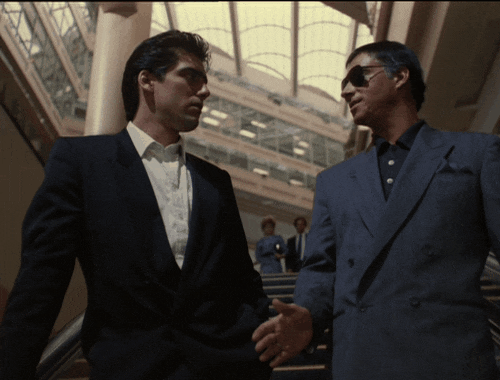
If you've ever watched and enjoyed anything that gets tossed around as “prestige television—” you know what I’m talking about— long form narratives, high stakes, actors with something to prove— shows like The Sopranos, Breaking Bad, The Wire, etc.— you have Wiseguy to thank. While largely forgotten by mainstream audiences (for a variety of reasons, including sheer lack of availability), Wiseguy was one of the first non-soap-opera shows with a fully serialized story— one that expected you to see every episode, in order. When it began airing in September of 1987, really the only other thing on TV like it was Michael Mann’s Crime Story (also worth a watch), and Crime Story would be canceled before Wiseguy even hit its second season.
Writers, actors, and industry types of all kinds cite Wiseguy as a major influence— Vince Gilligan and Tom Schnauz credit watching Wiseguy in the 80’s as why they cast Jonathan Banks as Mike— Chris Carter hired writers from Wiseguy when he started the X-Files— actors like Stanley Tucci made their names on the show— and hell, David Chase wrote an angry letter to the New York Times claiming he was absolutely under no circumstances at all influenced by Wiseguy ever, which feels like the kind of thing you don’t need to write a letter about if it’s true.
Of course, just because something is influential doesn’t mean it’s good.
Wiseguy is really damn good.
Much like Miami Vice (and some of the later shows that took influence from Wiseguy), Wiseguy takes the position that there’s very little difference between criminals and the police, and that the justice system is wildly ill-equipped to create justice. Mafia movie blood, with all its inherent moral ambiguity, runs through Wiseguy’s veins, and then after episode nine, it asks you to think about how that blood would pump in a different milieu— corporate espionage and the destabilization of the global south by American capitalists, insular rural politics and the easy rise of small-time dictators, congressional politics and Twelve-Angry-Men-worthy courtroom drama, the music industry and the cutthroat disposal of talented young people. Money and power structures are always suspect, and good-hearted tough guy lead Vinnie is constantly torn between doing his job, doing the right thing, and doing the thing that makes sense to him emotionally.
The show is heartfelt, tense, funny, and above all else, incredibly human. The characters behave irrationally— they self-sabotage, they struggle with moral decisions, they lash out at people they care about— because they’re people, not plot devices. Little things will come back to haunt them, often many episodes later, in believable and sometimes gutting—but rarely shocking— ways. Despite this realism, and a deep sense of cynicism about our institutions, Wiseguy never falls into the trap of wallowing in grim bleakness. The writers and the actors clearly believe in people— it’s a show that says— ‘yeah, the world sucks. So how do we keep going, together?’ The characters are lovable not because they’re all good, but because you feel like you could know them, with realistic flaws and foibles and senses of humor. Sometimes it’s a little silly, and sometimes it’s a little melodramatic— but it works, because sometimes that’s how real life is, too.
Wiseguy is four (well. three and a half) seasons [cross out— and a terrible TV movie that disregards canon], and is notably divided into 4-11 episode arcs within those seasons, and occasional “breather” episodes between arcs. It’s actually a brilliant bit of plotting that I wish more shows would do today— it allows for overarching narratives and real stakes without running into DBZ-like “the next threat has to be BIGGER and MORE DANGEROUS” power level bullshittery that’s common to a lot of long running serialized shows. One of my favorite aspects of this design is that the cast partially rotates every few episodes, but the show still expects you to remember what was going on with the characters from the previous arcs— because they often return later in unexpected and narratively satisfying ways.
The three characters that remain more-or-less consistent throughout the show are Vinnie Terranova, an undercover agent for the Organized Crime Bureau, Frank McPike, his handler, and Dan “Lifeguard” Burroughs, the OCB call-center operator who gives Vinnie field instructions.

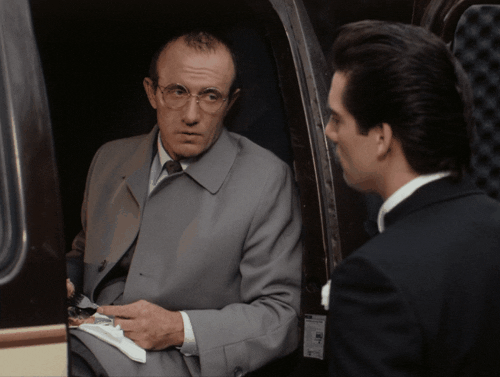
Vinnie Terranova is just on the border of thirty when the series begins, a gregarious kid-from-the-neighborhood, just out of a cover-establishing 18-month stint in prison. He is a bundle of contradictions— quick to fall but slow to trust, a practicing Catholic who chose a job in the field of lying and murder, a 50’s hood irritated by bigotry. Vinnie is both far smarter and more sensitive than anyone gives him credit for, which is both his greatest strength and his fatal flaw— empathetic undercover agents burn out fast. He spends a surprising amount of the series trying and failing to quit his job. He has a marshmallow center, a steel-trap mind, and the general affect of your cousin who dropped out of college to marry his pregnant high school sweetheart. He also has no idea that his type is “angry asshole” and keeps being surprised when he falls for them.
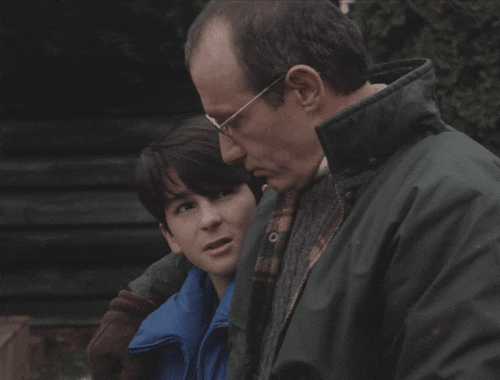
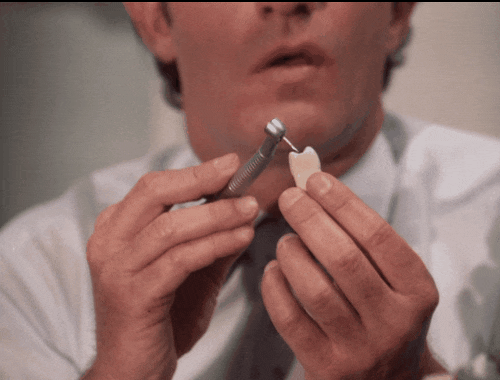
Frank McPike is a curmudgeon's curmudgeon, a career fed with a chip on his shoulder, a fathoms-deep sense of cynicism, and a collapsing marriage. He and Vinnie begin the series at odds, and as you watch the first few episodes, you're going to seriously struggle to believe me when I say that the affection between Frank and Vinnie becomes the absolute thematic and emotional heart of the series. Frank is also a genuine oddball failing to pose as a tough guy; he makes noises, he lurks in strange costumes, and the words he chooses when he’s irritated beggar normal human understanding.
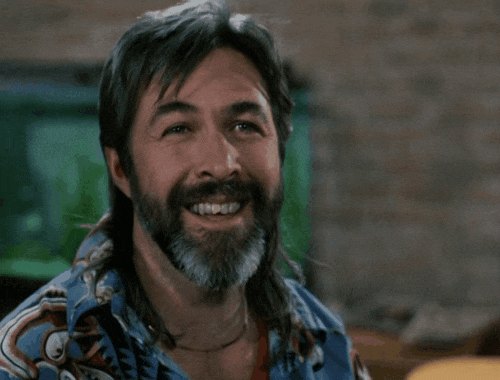

We don’t get to know Dan as quickly or as deeply as we get to know Vinnie and Frank (in fact, he’s introduced as “Mike”), but he’s the man behind the curtain, a guiding moral and emotional star for Vinnie, a talented musician, and a cheerful face with a lot of anger bubbling just below the surface. He offers life advice even as his own home life is in constant meltdown, and loves both Vinnie and Frank with a fierce, sarcastic weariness. Dan is also an amputee, and his disability is portrayed with respect and without pity— a rarity for television even now, but especially in 1988.
You’ll absolutely fall in love with these three, but one of the things that makes Wiseguy so special is its fantastic supporting cast. The world is fleshed out and lived in, and you get the distinct sense that all the recurring characters have their own lives we don’t get to see off screen. There’s Carlotta— Vinnie’s mother, as contradictory and sharp as her son, Pete— Vinnie’s brother, a progressive basketball-playing priest, Roger Lococco— a killer-for-hire who refers to every person on the planet as Buckwheat, Rudy Aiuppo— an elderly don with the heart of a trickster spirit, and a whole host of others who enter and exit the narrative throughout the arcs of the show. There are also a whole host of wonderful arc-based characters played by incredible actors, journeymen and and famous alike— including turns from Tim Curry, Debbie Harry, Jerry Lewis, Stanley Tucci, Patti D’Arbanville, Stephen Bauer, and Billy Dee Williams. You can tell everyone involved in the show had a fantastic time working on it, and nearly every actor who comes aboard really puts their whole Wisegussy into it gives it their all.
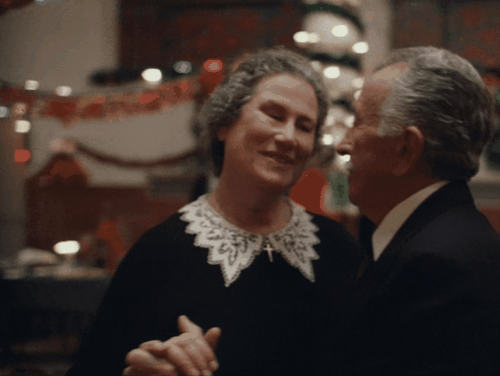



You notice that as I’ve been speaking, the lights have dimmed slightly, and the strains of an organetto have started to play quietly in the background. A man in a rumpled suit is smoking nearby, though you are fairly certain smoking indoors hasn’t been legal in a number of years. I pass you a plate of espresso and biscotti.
Let’s talk arcs.

The first arc of the show, known as the Steelgrave arc, is a lot of fans’ favorite arc of the show, and for good reason. Vinnie infiltrates a New Jersey mob organization, and gets very, very close* to this man:
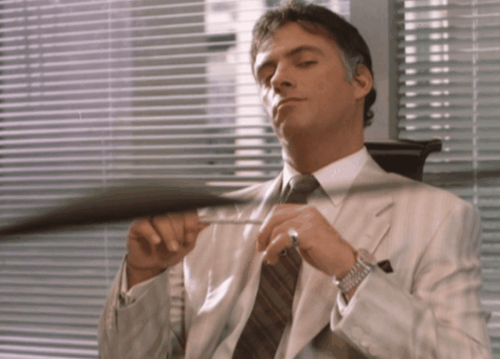
Sonny Steelgrave, human Knife Cat, is a complicated man, and Vinnie has complicated feelings about him. He’s very nearly a co-protagonist to Vinnie in this arc, and the show artfully toes the line between condemning him and making it clear that he’s not always entirely wrong. Vinnie’s goal is to get Sonny into prison and take down the entire family— how and whether he achieves this goal is best left unspoiled. Sonny may not have been the first complicated, likable villain on television, but his arc is intense, heart-wrenching, and splendidly morally grey. I don’t think it’s an overstatement to say that the Steelgrave arc is the best nine hour mob movie ever aired on television.

*I’m really not kidding about the closeness. There’s an episode where Sonny announces he’s getting married and literally all the other mobsters are like ‘oh, now I understand why Vinnie has been in a bad mood all day.’ They are as close to canonically in love as a federal agent and a mobster have ever been portrayed on screen.
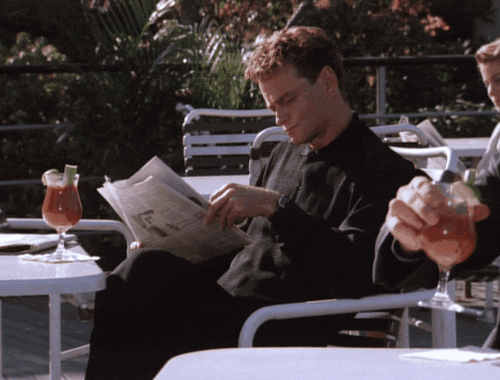

Lest you get Kevin-Spacey-jumpscared, the following arc unfortunately has Kevin Spacey in it. Thankfully he plays a slimy sister-kissing coked-up hypercapitalist, so it’s fairly easy to just hate his character in the same way you hate the actor and move on with your life.
This arc, the Profitt arc— in which Vinnie is tasked with taking down a wealthy business mogul who is suspected of drug-and-gun-running— is, for many fans, a close second to the Steelgrave arc. It’s an interesting change of tone and locale, and introduces Roger Lococco, who is a really stellar supporting character. Personally, I rank a bunch of other arcs above Profitt, because no matter how much I like Roger, Mel and Susan are bananas, and they wear out their welcome before they exit the narrative. Regardless, it’s a stylish arc— one that rather kicks truth, justice, and the American way in the teeth— and Mel’s machinations have serious reverberations later in the show. The Roger subplot is also genuinely excellent, and good old Corey Matthews’ Dad plays him with aplomb.
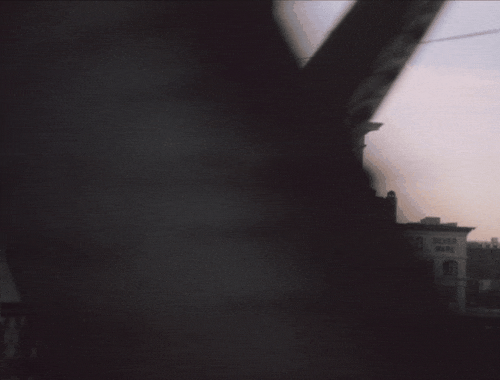
Back home, after trying to quit his job and failing, Vinnie has to deal with a threat with much smaller, but far more personal stakes. A white supremacy group has moved into his neighborhood and is attempting to recruit working-class Italians to their cause, pitting an older immigrant group against a newer one, pitting Catholics against Jews, and pitting a previously “ethnic” group’s newly acquired “whiteness” against people of color. I have mixed feelings about the Pilgrims of Promise/White Supremacy arc, because it’s truly quite good, and it pulls no punches about the kind of people fascists are and prey on, but it’s also exceptionally fucking upsetting that nothing has changed at all since 1988. Literally you could remake this arc word for word today and a) it would be exactly as believable, and b) your show would be immediately boycotted and canceled for being too “woke.” Great writing, great stakes, great character motivation; so, so uncomfortable to watch.
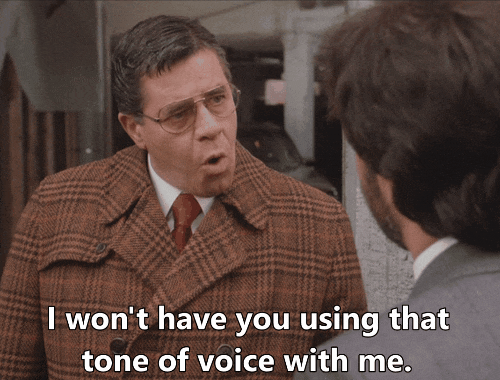
And then Ken Wahl breaks his leg in real life, and they have to replace him for a few weeks.
The Garment Trade arc starts off pretty promising— Vinnie meets with the son of a clothing manufacturer, they have great (borderline meet-cute) chemistry, it’s a wonderfully New-York-in-the-80’s kind of storyline, Jerry Lewis is there, and I think it’s the only time I’ve ever seen Sukkot represented on TV— and then Vinnie has to leave for the next four episodes because of Wahl’s broken leg. They rewrote the arc on the fly, and considering that, it’s pretty good. Jerry Lewis is still there, and he gives the serious, dramatic performance of a lifetime, and Stanley Tucci chews scenery as The World’s Slimiest Businessman. We meet Vinnie’s childhood bestie, “Mooch,” whose actor, delightfully, starred beside Ken Wahl in 1979’s The Wanderers. My beautiful and talented wife Joan Chen even shows up for an episode. However, all of this is undercut by the lack of Vinnie; his replacement, a semi-retired agent named Raglin, is… a bit milquetoast. He’s okay, and he’s given some interesting backstory in his final episode, but he’s no Vinnie.

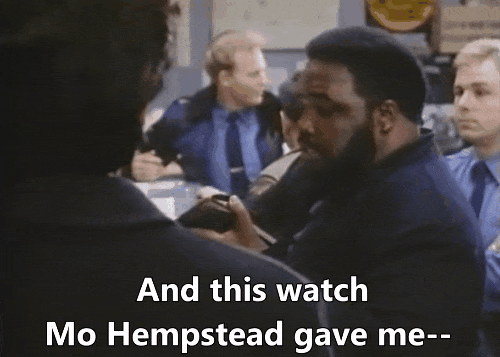
Once again sporting a functional leg, Vinnie returns, and my favorite arc other than Steelgrave follows.
In the Dead Dog arc, Vinnie has to pose as a music producer, because the OCB traded an airplane for a music label. It’s the dumbest, most fantastic plot device of all time, and brings me incalculable joy. I literally made Dead Dog t-shirts because I love this stupid fake music label owned by a fictional government agency so much.
The Dead Dog arc sees Vinnie at his happiest (the poor man really, really just wants to quit undercover work and stop being involved with Murder Organizations), and the crime he’s investigating is… wait for it… bootleg CDs. You would think this would be a ridiculously boring premise for an investigation, but the Dead Dog arc has Tim Curry, Debbie Harry, Glenn Frey, and Patty D’Arbanville playing a cadre of unhinged music industry moguls all attempting to stab each other in the back, and it is exactly as chaotic as you would expect based on that cast. This arc also had a bunch of original music produced for it, which is extremely fucking cool, except that then the studio lost the rights to the music it created and this arc became inaccessible and unwatchable except through circulating the tapes, so to speak, of early 90’s TV rips. (The irony is not lost on me that the arc about the Evils of Piracy is the arc that one must pirate.) Miraculously, in the last year, Wiseguy’s rights have been renegotiated, and the newest sets of the show have Dead Dog restored. Accessibility via streaming is still a bit of a mixed bag— the episodes were streaming on Tubi and Youtube briefly, but now appear to have been taken down again.

After his turn as a surprisingly successful music producer, Vinnie returns to his roots: the mob. In the Mob Wars/Trash Wars arc, Vinnie unintentionally becomes the temporary leader of the local mafia commission (I will not spoil how.) The OCB wants to use this as an opportunity to take down the entire organization from the inside out, and Vinnie must deal with mafia backstabbing, pressure from Frank and the OCB, and surprisingly personal stakes. It’s an unspectacular but solid arc that regrounds the series, and the interpersonal aspects of the story— and its examination of fathers and sons and generational inheritance of social rules and expectations— are excellent. The Mafia Wars storyline won’t blow your pants off, but it’s thoughtful and well-executed and reminds us of who Vinnie is and where he came from.
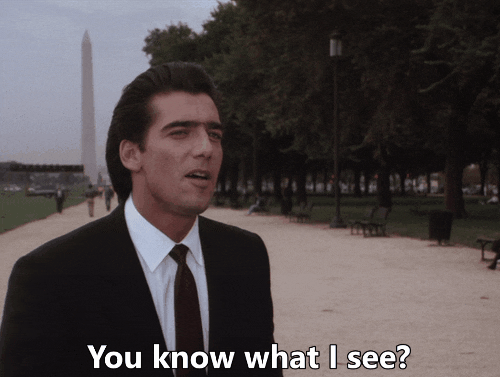
What follows is another of my favorite arcs, referred to as the DC or Counterfeit Yen arc, but perhaps better described as the Mr. Terranova Goes to Washington arc. Vinnie is summoned by the federal government to investigate counterfeiting, and thus unfolds a multinational conspiracy that ties back to the Profitt arc. Much like the White Supremacy arc, this arc is distressingly current— Vinnie is a patsy for a group of corrupt republican senators who want to destabilize the currency of a perceived East Asian economic rival. It’s Yen here, but all you’d need to do to bring this arc into 2023 is swap out references to Japan for China, because the American government has changed very little from the 80’s and has to be awful about some country somewhere or, I don’t know, a bunch of horrible old racist politicians will shit themselves. Vinnie enters talking like Jimmy Stewart, and leaves with one more thing to be crushed and disillusioned about. We get some riveting and stomach-churning courtroom drama, the bad guy turns out to be capitalism all along, and Frank threatens to shoot a Howard Hughes stand-in on a ski lift.
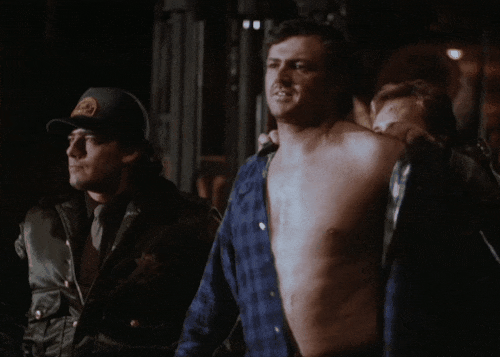
And then somehow we end up in Twin Peaks. The Lynchboro arc predates Twin Peaks by a whopping two months, indicating a total coincidence of premise similarities, but it does take place in a corrupt rural Pacific Northwest town unduly influenced by one large family/company, wherein an outsider has to investigate a tangled conspiracy and deal with strange townsfolk and some spooky happenings. There’s no way either show could’ve plagiarized the other— they were assuredly written and in production at the same time— but it is deeply bizarre. In the Lynchboro arc, Vinnie goes undercover as a local beat cop, and finds himself faced with both a serial killer and a land-rights and building-contracts espionage plot. He also has to deal with Mark Volchek, the ostensible “owner” of the town, and his eccentricity and decreasing grip on reality. Roger returns, and Vinnie must finally confront the enormity of his trauma. One major character is literally brought back from the edge of death by another character’s crushing love for them, expressed via church bells. It doesn’t exactly end on a cliffhanger, but it doesn’t not, either.
And then Ken Wahl quit.

Season Four begins with a deeply depressed, heavily bearded Frank struggling to find the will to live after Vinnie has disappeared. (I don’t think I’m really at risk of spoiling anything serious by saying that we are “supposed” to think Vinnie is permanently gone, but that there are a huge number of blatantly spotlighted contradictions in that story. Wahl left on decent terms, and I firmly believe the Wiseguy staff was expecting to eventually win him back to the show and have his absence turn out to be a ruse. Unfortunately, Wiseguy got cancelled before this could happen.) Frank spends the first (and only complete) arc of this season investigating his partner’s disappearance, eventually working with the supposedly-corrupt DA who helped establish Vinnie’s cover back before Season One.
It’s not an uncommon opinion to say, ‘hey, just skip S4’— and honestly, if you chose to watch S1-3, you’d have consumed a wonderful story with a reasonably coherent ending. But I don’t actually hate Season Four. The “new Vinnie—” Michael Santana, played by pretty-boy Scarface alum Stephen Bauer— is exceptionally likeable, and he brings with him a new set of characters who are also quite compelling. Furthermore, if you’re a Frank fan, he really gets the spotlight in this season, and if you’re a Frank/Vinnie fan, Vinnie may not be around, but Frank’s despair is really fucking something else. It’s almost worth it just to see him lie to the FBI and tell them he “never crossed the line” of professionalism with Vinnie.
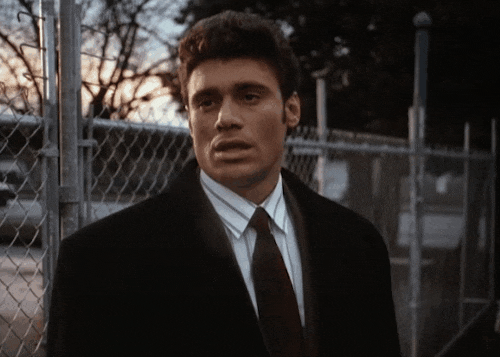
Unfortunately, the next arc sets up something really compelling and unique, but it’s only 3 (unaired on TV) episodes, and ends on a complete cliffhanger, because the show was unceremoniously cancelled. After his niece is shot in the midst of teenage gang violence, Michael teams up with Billy Dee Lando Calrissian Fucking Williams to investigate red-lining and racist underfunding of schools. Oliver Stone shows up in the last like, ten minutes of the last episode?? I would be all over this storyline if it wasn’t just dropped like a moldy tomato, but I guess that’s what fanfiction is for. It’s not how Wiseguy deserved to go out, but hey, it was really aiming for the stars even as the plug got pulled.
Oh, and if anyone tells you there’s a 1996 TV movie, no, there isn’t.*
(*The movie is so deeply mediocre that it’s worse than any of the controversy surrounding Season Four. It essentially retcons all of S4 and, frankly, really the last few episodes of S3, and presents a bland, uninspired “getting the gang back together” story that retreads thematic materials from the show without saying anything new. Vinnie has apparently been doing wiretapping for 6 years, which is completely at odds with everything we know about his character, and he and Frank are treated as “dinosaurs” that the OCB doesn’t know what to do with, and yet they are also simultaneously the only ones who can take care of a nearly-kidnapped child. It’s rushed, it’s emotionally hollow, the actors are phoning it in, and it ignores all of the character development from the series in a way that renders its plot nearly nonsensical. Furthermore, Ken Wahl had been in a seriously disabling motorcycle accident a few years before, so his apparent discomfort and stiffness throughout the film is because he’s genuinely in significant pain. Don’t watch the movie. You can always write fix-it fic for how Vinnie manages to come back after Season Four. It’s much harder to write fix-it fic for boring character assassination written by the 'due-process-is-for-pussies-and-torture-works' 24 guy.)
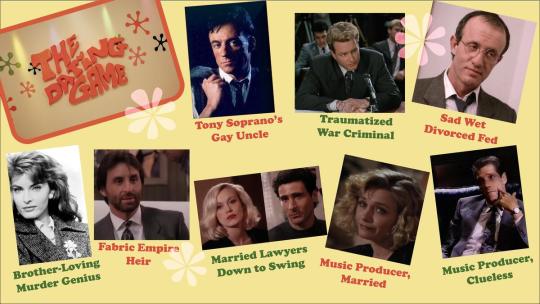
One of the other delightful things about Wiseguy is that Vinnie is both a big softie and yet is also saddled with a bizarre sort of erotic smolder, and therefore he has ridiculous chemistry with basically half the cast of the show. Vinnie very much seems a guy like you could say some blandly nice things to and buy him dinner, and you’d wake up, exhausted and satisfied, the next morning to him cooking breakfast. You’d think, wow, this guy is so thoughtful, he must be the one— and then you’d turn your head and he’d have immediately been seduced by the next schmuck down the line. He’s a good boy, but his “acceptable romantic target” sensors are so wildly mistuned as to render him, affectionately, a tragic slut. Will he end up with a mobster? One of a number of widows? His boss? No one knows but god.
Vinnie is also heavily bi-coded— his relationship with Sonny is almost explicitly romantic, he calls out Roger for homophobia (in 1989), one of his old friend asks if the reason he’s not married is because he ‘likes boys,’ and he doesn’t say no, and he has a borderline I-love-you moment with Frank. The boy just wants someone to love him, goddammit.
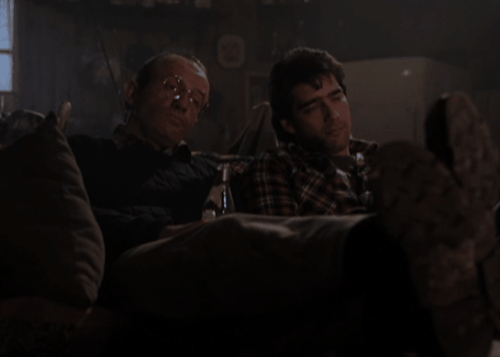
I’m also really not kidding about Vinnie and Frank developing into the emotional core of the series. They live together for a period of time. They both imply they can’t live without the other. They go shopping for Dan’s birthday together. They pick up Frank’s ailing father from the nursing home together. Frank picks out Vinnie’s tie.

You pick at the plate of spaghetti that appeared in front of you, unsure of either its provenance or why it came after dessert. It’s the best spaghetti you’ve ever had, and that frightens you, somehow.
I lean in close to whisper to you about crime. You note that at some point I changed into a pinstriped suit. You don’t remember me changing, or even getting up— you console yourself with the notion that maybe I’d been wearing it from the start, even though you know that isn’t true.
So, the thing about Wiseguy is— well— it’s more available than it used to be. The whole series was recently released on blu-ray, and both that set and the most recent DVD sets actually have every episode, a change from the previous releases. As of August 2023, all of the series except Dead Dog is available, legally, on Youtube. This is a vast improvement from even two or three years ago, when multiple episodes weren’t available through any means but blurry, VHS-tracking-laden downloads of TV rips.
Unfortunately, the most recent renegotiation of the series home video and streaming rights still failed on the music rights front. Dead Dog has been spared the hammer, but there are still places where the series has gaps. Notably, there’s an episode (Stairway to Heaven) where Frank murders a jukebox, and looks completely fucking insane, because the original (thematically meaningful) music the jukebox was playing was replaced with generic elevator music. Worse, the final episode of the Steelgrave arc (No One Gets Out of Here Alive) is missing two musical cues: in one instance, Sonny himself is singing, in a fit of mania, and the footage has straight up been cut from the episode because they couldn’t get the rights to The Young Rascals’ Good Lovin’. Equally egregious, The Moody Blues’ Nights in White Satin, which originally played over nearly a minute of sustained, silent eye contact between Sonny and Vinnie— has been replaced with the Wiseguy opening theme. It renders a scene which should be quite clearly devastating and unsubtly romantic instead utterly awkward and bizarre. It’s hard to demonstrate just how jarring the change is unless you’ve seen the scene, but suffice to say that everyone I know who has seen both versions— in either order— has expressed horror and bafflement at the substitution.
Which is to say: there’s a couple of episodes of Wiseguy you’re probably going to want to locate those shitty old TV rips of. It’s worth it, even if it seems like it wouldn’t be.
I place my hand over yours. You jump a little. I have a number of large, dark-stoned signet rings, and my hand is strangely cold.
I make you an offer you can’t refuse.
You’re going to watch Wiseguy.
34 notes
·
View notes
Note
what you said about maxiel fanfics with endgame lest4ppen, yes, I agree. someone mentioned this before, but maxiel is slowly dying on ao3 while it seems to be thriving more and more on tumblr.
for me it's 50/50 because I don't mind where I'm reading, but here we have more one-shots and pieces of WIPs (which is good because it means authors don't feel the pressure to turn everything into a 50k story, so they can just post their ideas even if it's incomplete), but I personally LOVE longer stories, so I would love to read more and more about every single one of them.
and personally I just don't like lest4ppen at all. I understand the need to tag maxiel because daniel is the bad guy and the "shitty boyfriend" or whatever, but I just don't like seeing those stories 😬
will always preface asks like this by saying people can like what they like and find joy in whatever, i ain't gunna turn my nose up at anyone or anything, lestappen just doesn't make sense to meeee personally, but honestly whatever butters ur bread!!!
as someone who has dabbled here and there in this writing lark, for me there is a distinct difference in ao3 posting and tumblr posting....ao3 to me is formal, ur presenting something perfect, a fully-fledged story, a beginning a middle and an end (not in all cases but i just mean in general). most stuff i read on ao3 is fully-fledged nuanced ideas that the author has obviously spent hours of time crafting and experimenting with.
tumblr fic is inherently fun and blase and easier to throw out there into the ether and forget about really. tumblr fic doesn't need to follow grammatical rules or structure etc etc....it can just be a fun prompt game response or a quick lil fic that you had fun writing and wanna share with ur people?? both have purposes and both are enjoyable to write imo, just depends on what ur feeling and how much u want to expand on said idea??
when it comes to the maxiel of it all....idk how rude or pointed i can get here without getting into shit....so i'll try and word this gently....you have to keep the eco-system alive....i think comments and kudos are GREAT but honestly, if someone reblogs my fic with a fun few tags, i love that more, because in a selfish way, i might get 1 or 2 more readers from that because its going out to an even wider audience?? but its more than that!! engage with ur writers, message them on here and shout at them about their ideas, send them prompts, recommend their fic to ur friends...but i will stand by i think one of the best things you can do, if they make a fun lil post or graphic for their fic...reblog it...ur not only spreading the maxiel gospel, but ur also supporting that writer?? too many times on here i see people's fic graphics flop yet big blogs are leaving them comments on ao3 and look, EACH TO THEIR OWN and also i can sometimes be a bad reblogger dont get me wrong, but LIKE, there are some wildly talented authors on here who just need to be pushed into the limelight a little bit more??? idk if im wording this correctly, but sometimes there are fics that fall through the cracks because no one engages with them, and if ur an author who has put blood sweat and tears into that fic, ur not exactly going to be motivated to post another maxiel fic if u dont think ur going to get engagement from it (again, fic writing isn't necessarily about engagement or response, but let me tell u when i get a fun little comment or someone messages me about a fic i published, it inspires me to write more????)
maxiel is definitely alive and kicking, i follow some stunningly good maxiel authors, but at the same time, its about pushing forward those smaller writers as well and not thinking ur too cool for them???????????????
and so with that, this flufftober, kinktober, spooktober or whatever tober u are a part of, reblog the fic, talk about the fic and enjoy the fic
#if u can understand what i am trying to say here then well done cause i dont think i even do#mean thats a lie i do know what im trying to say but i know a lot of people would hate me if i said what i actually wanted to say :))#anon#asks
36 notes
·
View notes
Text
Religion in Relation to Jesus Christ Superstar
(CW: Religious trauma, slight stream-of-consciousness, imposter syndrome)
It's no secret now that I love Jesus Christ Superstar. The music, the way the story is presented, the history of the musical, and the talented actors are what drew me to it and kept me interested. Hell, it even made me download TUMBLR just so I could interact with others who enjoy the show (which is lovely, you're all lovely and I'm having such a good time).
Sometimes when I'm doing my wholely unnecessary research on JCS, I find a bad review from a devout Christian, claiming it to be blasphemy of the highest degree. This doesn't particularly bother me, as I am no longer a religious person, and I can easily brush these reviews off as extremists finding things to complain about.
I've found myself researching the book the rock opera was based on. You know the one. It's a fascinating story; I don't think many people disagree with that regardless of what religion they align themselves with. However, as with most things on the internet, it's hard to find information that is unbiased (unless I choose to read the full Bible, which I'm not interested in doing at the moment). I see how passionate these people are about their faith, and how many use that as an excuse to belittle and isolate others. This is something I've always been aware of, and it's something that's affected me personally.
When I come across these kinds of things online, I start to feel a pit of anxiety growing in my chest. I respect anyone of any religion so long as they do not use it as a means to harm others (physically, mentally, psychologically - in any way). But when I am presented with a Christian explaining why everything I believe in and stand for is inherently wrong, I begin to feel as if I'm still a young girl being berated for going against the Lord. To make matters worse, I am queer, though I am well aware that any accusations that this is a shortcoming are without truth.
Part of what drew me into JCS is what I and some others believe to be queer undertones. The intense relationship between Judas and Jesus is captivating to me, and I find it healing to examine the story of Christ this way. I had been avoidant of all Christian-related media for such a long time after I decided to detach myself from the religion. Any mention of it brought back years of shame and fear that, in my opinion, do not align with the morals the Bible depicts. If that is not what I am meant to feel when presented with the power of the Christ, then why should I subject myself to it? But when I found this musical, I was so intrigued that my inhibitions became insignificant. I only notice now how unprepared I was for the feelings that arose within me when re-introduced to my experience with religion.
I think the main issue comes with Christians believing they are entitled to the words and story of the Bible. Against my better judgment, and due to my past, I feel sometimes as if I'm intruding on an aspect of human culture that was not meant for me. In reality, I recognize that all I'm really doing is enjoying a story that I relate to and that inspires me to create and live my life as I want to live it. My learned instinct is to feel repentant when any person says I am wrong, especially when it comes to my experience as a queer woman. I read the relationship between Jesus and Judas in JCS as romantic. I have seldom seen such an intense portrayal of homosexually-charged angst, even if that is not how it was meant to be read. And I relate to it. And it heals a part of me. And I may be reading way too far into this, but I'm already devoting so much of my time to this property, so I may as well get something useful out of it.
I wonder if any other fans of JCS have felt this way. Like we are not allowed to enjoy something simply because it is not a story that is meant to be heard as we are hearing it.
My mother wonders why I haven't since converted back to Christianity after watching Jesus Christ Superstar. But this is the furthest from Christianity I have ever felt. And it the most at peace with Christianty I have ever felt.
#jesus christ superstar#jesus christ superstar 1973#religion#religious trauma#stream-of-consciousness#imposter syndrome#rant#relatability#queer community#lgbtq#jesus x judas#agnostic
57 notes
·
View notes
Text
It says a lot to me about the Snape fandom and the issues a lot of people have to deal with, that so many responses to that imagining (not even headcanon) of what happens in the rest of SWM that we don't see are just assertions of human nature being terrible and that no one would have cared.
I'll skip the tangent on how that's not even what the post was about (it wasn't about people becoming sympathetic towards Snape, and it wasn't about James becoming a better person - it was about the effect of seeing that degree of bullying on the students who witnessed it). I'm just... a little worried about the cynicism I'm seeing?
Bullying makes most witnesses uncomfortable. They pretend it doesn't when it's happening because they don't want to stand out from the crowd and be targeted next. And because they often don't know what to do even do about it. Most people don't realize how much agency a bit of confidence (even if feigned) can give them. They want to fit in and be like everyone else, and everyone else is either ignoring the bullying or teasing the victim too, so they think they're being weird and everyone else is fine with it, so they should be too. But, as it turns out, most people aren't fine with it. Sure, some are, and some people are also just terrible people and are bullies themselves. But if you've ever talked to adults who witnessed someone else being bullied when they were a kid, most of them say they felt bad for the victim, they felt awkward, but didn't know how to speak up or were afraid to. There's a lot of "better them than me."
I'm not saying it's OK, by the way. Bystanders being cowardly is still shitty. But people are much more complex and inherently empathetic (that's not naivetee, that's proven by sociological studies repeatedly), partly because we all see ourselves in others. It's an ingrained part of being social mammals. So this idea that a group of onlookers can see their fellow student being made vulnerable and helpless while he's humiliated, and they wouldn't respond to that in any negative way and see it purely as entertainment, is... a profound misunderstanding of how people work.
James went as far as he did because of his contempt for Snape, but the others in that crowd didn't feel as strongly. James was acting out his feelings of "I hate this guy and how he's friends with the girl I like while she keeps rejecting me, I hate that he's smart and talented when he's from a clearly working class background and doesn't belong in the same class as me and my privilege." The crowd saw Snape as "that weird kid none of us are friends with." In SWM James basically acts on his own feelings fully, and my personal imagining (that no one has to agree with just please can people maybe try to express their disagreement in a way that doesn't assert it as fact, because it's weird y'all, it's weird when you posit your personal HC as fact) is that the gap between how much James hates Snape and how much the crowd just dislikes him becomes too wide, and James' actions no longer align with the crowd's sense of what Snape, as a weird kid, deserves. "Well, back then it was just what you did, there was always a kid who got beat up all the time" is often followed with "I felt bad for them, sure. Everyone knew their bully was a bully. But I didn't want to say anything. I didn't want to end up getting beaten up too."
My point is, there's a lot of internalized abuse victim and also some unintentional (?) enabler behavior I'm seeing on this post and I just... hope y'all are OK.
49 notes
·
View notes